#like in an existential way. like in a this does not bode well for our immediate future way
Text

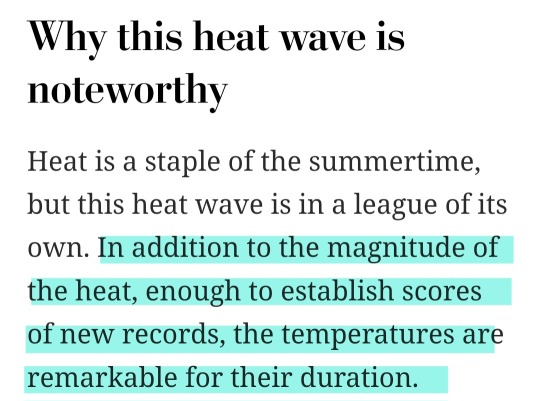
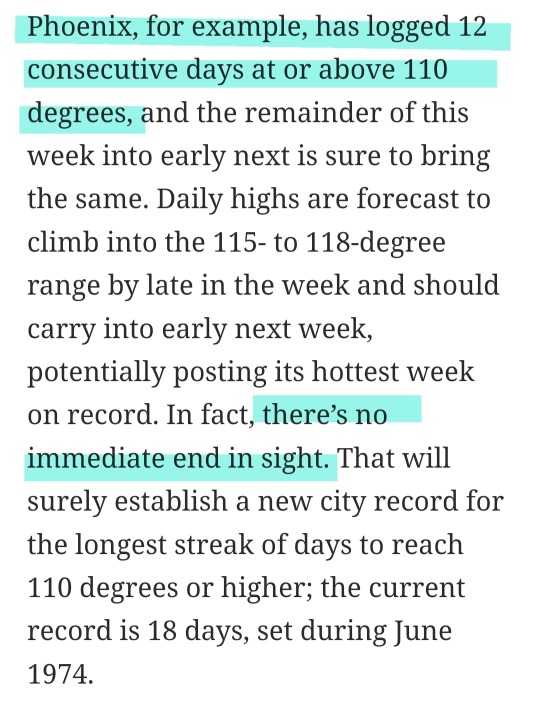



From this article (published july 12, 2023)
#y am i posting this? bc its 2am and its 80+ degrees outside and probably around that temp in my apartment as well#im a healthy young person so im fine but like idk living thru this heat wave is genuinely quite scary#like in an existential way. like in a this does not bode well for our immediate future way#like i did not grow up in a place whwre the temp is 100+ consistantly but like its so hot#like the sun has like a physical weight even with low humidity. its oppressively hot#and i only live in an area where its 102-107F or 38.9C-41.7C#just. if ur in the southwest stay safe. if ur outside the southwest or another place currently experiencing a heat wave: its pretty awful#real life#heat wave#and id anyone tries to come at me on the science. i literally have 2 advanced degrees in environmental science. this is just one year but#its notable that its happening especially with record highs popping up across the globe. not just in the summer. it does not bode well
40 notes
·
View notes
Text
animaniacs - s4e8: mindy in wonderland

episode summary: a lighthearted episode about mindy chasing a rabbit down a hole in the tree she’s always tied to, and ending up in a magical, literary dreamland. there’s no mice, but it’s fun, and takes up the whole runtime, and-- what? no, i-- look, it’s just-- i don’t--
sir, you don’t pay me at all--
alright fine ugh ughghghguhgughgu ugh.

great.

episode summary: the hip hippos are expecting a baby! unfortunately, ordering babies off the internet instead of concieving them through, like, hippo sex? appears to have its’ downsides, and instead they are presented with.... brain.
look, i don’t know either, okay? i’m dragging my hands down my face as we speak.
the rundown:
we open with the stork.

“i got a very special delivery! the rockefellers have been waiting weeks for this one.” he pronounces it “spatial”, probably because he’s high out of his mind. this is not a sober bird. please don’t drop that baby, my dude. that’s going to cause more problems than it solves, really.


spoke too soon, i guess.
unfortunately for him, our dude does exactly that, and ends up taking a bit of a tumble. gets all dizzy. this does not bode well for the plot. or the wellbeing of the baby, actually!
hold up. computer, zoom, enhance.

hmmm. that is a very familiar tiny face. troubling. anyway our resident avian expert on drugs seems to have survived his accident, and drops the baby off to the rockefellers with no further trouble.

they seem to look more. hippo shaped than usual.

“congratulations! you’re new parents!”


you’re welcome, weird stoner bird. they slam the door on him, wordlessly exacerbating his injuries. they care not for his plight, only that of their dearest, darling... not very.... hippo sized...................... baby.
hm.

“oh flavio! darling! a baby of our own, just look at him! let us call him--”

“--alfredo!”
“goo.”
alright. as existentially horrifying as this episode is, i laughed. maurice lemarche, completely dead in the face, sits in the recording booth, stretches his shoulders. “goo.” he says. deadpan. no intonation whatsoever. the audience cheers and he is given a thousand dollars.
i don’t know what it is about brain saying basically anything that appeals to my sense of humour so much. jockey for position basically did me in. i just. every time he says “goo.” i am in TEARS.

the hippos seem to have lost their enthusiasm, as anyone would have if they heard the voice of a grown man come out of their newborn baby.

“he’s... small. very small.”
“goo.”
still, marita sympathises with him. this is very definitely her child, after all! she steals him away to do mom things with, chastising flavio that ‘alfredo’ is “their little boy.”

“oh, you are right, my lightbulb of love. now our little universe has expanded to three.”
yeah, don’t include your.... shoulder... birds, then. asshole.
it’s very cute, i’ll say that. for all the fuss i make about the hippos, they do love each other, in a very healthy way that you don’t often see with married couples on tv. like, they’re kind of slowdancing their way out of the room. it’s nice! they would make good parents.

(”goo.” says brain, in the background, oblivious to the heterosexuality happening around him. “now, take me to my money.”)

credit to flavio and marita; they are very well prepared. this is a very loved baby. i’m not entirely sure how any child would feel about the presence of Clown Bear, but it’s the thought that counts. also i know that’s a changing table? but the design is sick and i wouldn’t mind a chest of drawers like that.
there’s also a theatre, i guess. or..... maybe just a really fancy shower???

Definitely Alfredo is gently placed on his little Alfredo Table. he appears to be asleep, or at least he’s deliberately choosing to keep his eyes closed. can’t think why.

but he, ah. sure went all out for this one. i respect brain for his dedication to the craft.

“now, sweet baby alfredo,” says marita, while the music does a terrifying swell in the background, for some reason, “it is time for your first bath.”

please stop looking at me like that, marita. YOU ARE NOT IMMUNE TO BATHING. am i about to be inducted into the alfredo cult?? i am, admittedly, a manlet, but i would like to think i am also unmistakably larger than a baby hippo.
(google has no data about the height of a baby hippo, apparently. they do weigh about 100lbs at birth, though, so i guess i have to be careful with this losing weight shtick. not that i’m ever gonna weigh 100lbs, quite frankly, but the minute i do marita’s gonna climb through my window and steal me off to los angeles.)
(i’m terrified.) (on the other hand, they’re definitely going to give me back as soon as they work out how much my medication costs over there.)
i’m literally babbling nonsense, at this point. anyway. brain gets a bath.

remember to Wosh U Mouse. wash he teeth and soul. marita proclaims excitedly that “babies love the bath”, and Definitely Alfredo is Definitely Enjoying Himself, judging by the screaming, so, yknow, good for him.


and then, i guess, flavio just pours boiling water on him for no reason, so brain freaks out and launches himself into the light fitting.



because wouldn’t anybody?
the hippos freak out a bit when the lights stop working, but soon get brain back down to resume their usual Alfredo Activities.



“this is highly undignified.”

but still, marita loves him.

and then she stabs him in the dick, i guess.

“GAH.”
“oops ):”

fortunately, nobody ever died of getting stabbed in the dick (as far as i know?) but even magical babies delivered by amazon need to get their vitals checked, so flavita take him to the hospital anyway.

bomf.
i’ll be dead honest with you, this scene is just torture porn. i’ll summarise it as best i can.


temperature is fine. blood pressure is normal. i am pretty sure inflating babies is not standard medical practice, but brain is cosmically unable to have a good day or he dies, i guess.

the doctor shows up.

“oh, but you’re a cutie. say aaaah.”

“if you think that you’re going to stick that thing in my--”





it’s not very comfortable.


“hmm. rather puny.”

“you have to feed him more.”

NOW LET’S TEST YOUR REFLEXES

i’m pretty sure this man has never been to medical school.
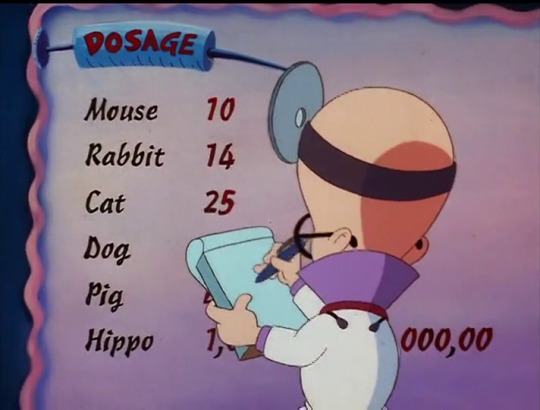
“and now to vaccinate. my, that’s a lot of zeros.”

my, that’s a... screenshot that lives on my laptop now, i guess. hopefully nobody i know ever has to borrow this thing, for whatever reason.

“i’ll see you in three months for a booster shot,” says dr acme, as brain swells and changes colours in a way that no baby ever should.
i feel like this is a good time to interject - my issue with this episode is not the core themes, or anything surrounding them. it’s the amount of unrestrained suffering that goes on within that. like. okay. if this was some kind of consensual dynamic between the three of them for-- whatever reason???? stress?????? - like i wouldn’t mind. i wouldn’t care. consenting adults can do whatever they want with their bodies. this is a positive space. no judgement here on pinkys fault or brains fault dot com.
but it’s not and brain spends most of the episode in pain and terrified and that’s really what i object to above all else. it’s the same problem i have with peatb, really. brain can wear as many cute dresses as he wants, but he’s gotta want to wear them.
but they’re back at the Hippo Digs now so. it’s fine, i guess.

“such a good boy. that trip to the doctor wasn’t so bad, was it?”

hm.
still, it appears i can never escape Terrifying News Lady, even in this hellscape. flavio does the classic dad thing of sitting down with the tv as soon as he’s home, leaving marita to deal with getting Definitely Alfredo settled in his correctly-sized-for-a-baby-hippo baby chair.

what are those straps connected to, anyway??? it’s not the chair, that’s for sure. is brain just wearing a harness for the hell of it? what on earth is going on?

but flavio! it’s time to feed the baby!

“is baby-waby hungry-wungry?” well are you, cranky big head mousie??? huh????
sorry for the paralysing fear that probably caused all of you. undeterred, the terrifying news lady continues to talk in the background about the “richest and most influential child in the world.”

oh no.

oh no.
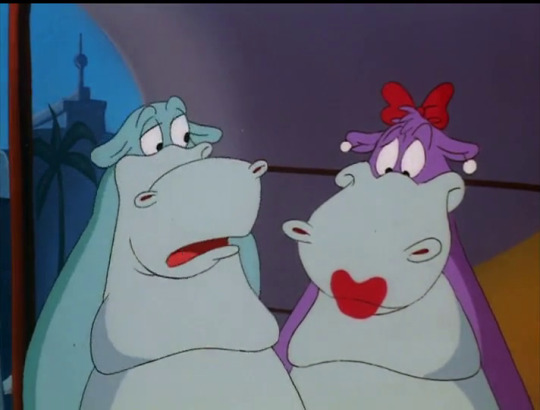
flavio vaguely wonders if they waited too long to feed their baby, as he has what could be possibly classified as a tantrum.

“you sophomoric, corpulent, pachycerebal aristrocrats! you are imposters and i demand to be taken to the rockefellers immediately!”
the birds don’t care. they’re chilling. marita attributes this to “baby gibberish” while flavio wonders about the “vocabulary he learnt from mr rogers”. he’s maybe a few hours old, at this point, a day tops, but i guess hippos learn latin in pre-k or something.
anyway so then they stick a tube down his throat and inflate him with guacamole.
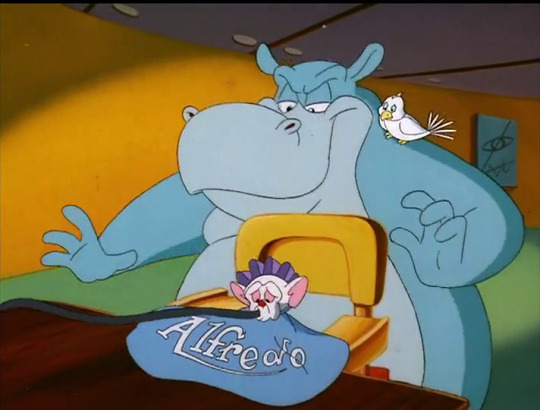
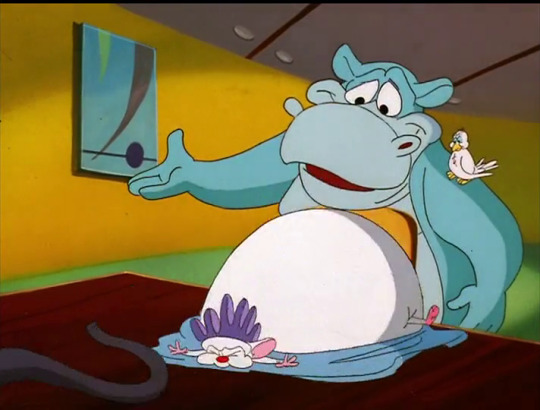
and with that, “alfredo looks healthier already!”
this is the second time brain has been inflated in this episode. it is unsurprising that he dedicates his nights from this point to raising absolute hell.

but he needs pats first because he ate too much. :<


cut to that night, i guess! where brain is very convincingly crying. very loudly. the hippos look unimpressed, despite the fact that this is literally the most common factor of signing up for a baby.

“it’s the baby. you take care of him.”

well. alright.


air mouse. nyoom. he seems to catapult himself at something, like, once per episode. it’s on par with the closeups by now, surely.

bomp.


unfortunately, the bear is not weightbearing (bear ing. lol) and falls off the shelf on an epic quest for a Great Big Hug.
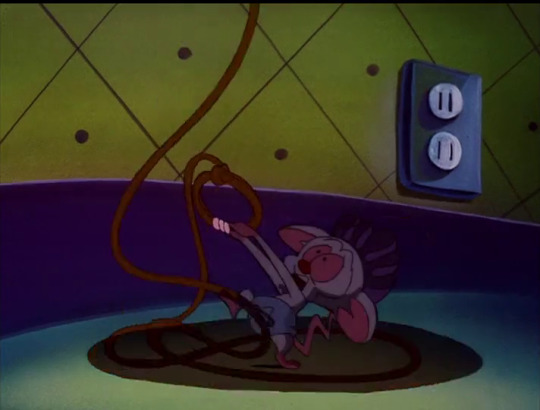
the resulting bomp alerts the hippos, who go fully, entirely haywire the moment they work out that Definitely Alfredo is not in his correctly-sized-for-a-baby-hippo baby bed.

turns out flavio sat on him.

“really, flavio, be more careful where you sit.”
so they put a padlock on his crib.
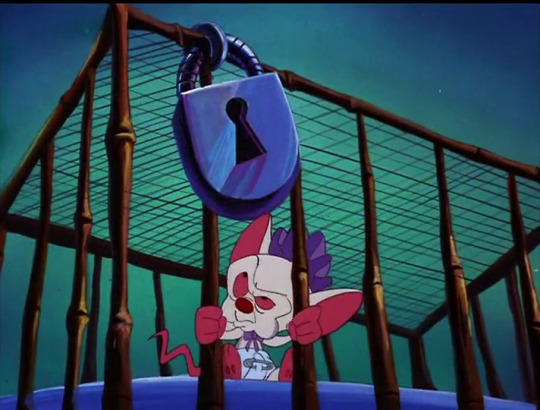
this is completely useless. i know this. brain knows this. he’s small enough to just... fit through the bars. but he decides to be dramatic, instead, because that’s what he does best.

“attica! attica! i want out! let me out!”
i am not old enough to get this reference.

i am, however, old enough to empathise with this exact emotion. i feel kind of bad for the hippos, actually. i’m sure they were doing what they thought was... right? in the context of... thinking they had a baby hippo rather than an adult mouse. easy mistake to make. i go check on my weirdly tiny hippos in their hippo cage all the time.

but who could be at the door?


“there seems to have been a mix up. uh. i have your baby right here.”
and guys?







i need to tell you how fast they just throw brain at the guy. it’s actually a little heartbreaking.
but! it’s okay! he still has time to make it to the rockefellers before they......... die. i guess.
man, this plan was not thought out very well.
conclusion:
thank god this is almost over.

the stork repackages the baby, who is now a good few hours old, at least, and delivers the bundle to the very, very different looking house.



they are not any nicer.
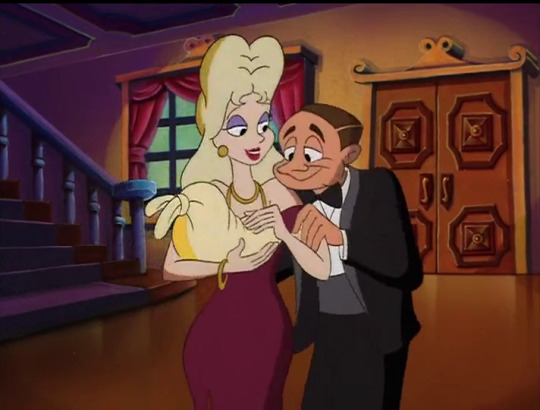
“oh, reggie. just look at him.”

“goo.”

“well, frau haussenheffer, we’re off on a cruise. goodbye baby. see you in a year.”
parenting!

“alright then. staff, we have a brand new charge.”
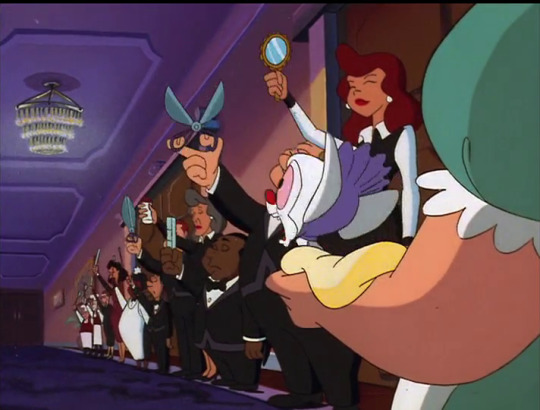
oh dear.

brain, as one can imagine, is having none of this.

but unfortunately, neither is the carpet.


bomp. cause of death: suffocating in the rockefeller mansion carpet.
good thing it all sort of blurs out, huh.

“brain?” AAAAAAAAAAAAAAAAA “brain.” AAAAAAAAAAAAAAAAAAAA “brain, wake up.”

“i was dreaming?”
oh, thank god for that.

“oh, pinky, you wouldn’t believe the nightmare i had.” and it’s... probably best not to tell him, actually.
“it must have been a doozy, brain! but, oh, a delivery came for you.”

“it’s the rockefeller baby. can we keep it?”


oh dear.
so let’s ignore the fact that this asks more questions than it answers-- but okay, was that a dream within a dream, and why was brain dreaming about that in the first place, and-- and mark this one down as a severe case of outside influence.
brain: 3 ½
pinky: 5 ½
outside influence: 10

“it’s not too late. i demand that you deliver me to the rockefellers immediately!”

“
“aw, how cute. i just love baby gibberish.”
#patb#a!#pinky and the brain#animaniacs#i'm almost done with a! now!#only one more short to go#more importantly#i'm done with this short specifically. so i never have to watch it again
23 notes
·
View notes
Text
#wip wednesday
because of my new job i haven’t been able to update star trek au as quickly as i had hoped to, so have a preview of the first chapter of part three! there will be some pretty big spoilers for the plot of the first chapter and of part three as a whole, so if you want to be surprised, don’t read below!
True to form, after just forty-eight Asuma-less hours the crew of the Corvus manages to run into trouble.
In hindsight, it is perhaps Itachi who has doomed them all by privately remarking that things have gone surprisingly well in light of their lead pilot’s absence. Though he hadn’t wanted to admit it to the Captain, Itachi had more than a few concerns about Asuma leaving the Corvus in the middle of such a tumultuous and unpredictable time. Now more than ever they needed Asuma’s steady guidance and even temperament to help them brave the tides of bloodshed and deception, and despite his best efforts Chouji could hardly fill Asuma’s incredibly large shoes. That said, their ship had been blessed by calm skies and radio silence since Asuma’s departure, an occurrence that was as bizarre as it was appreciated. And so, with the Corvus seemingly flying under the radar, the crew focused on the mundane minute-to-minute struggles of keeping a massive spacecraft functional and flying rather than fussing over the existential crisis that was intergalactic warfare lingering on the horizon.
It was a pattern that Itachi was all too happy to fall in line with, right up until the moment he was summoned to the bridge on the afternoon of Asuma’s second day of leave. Such an occurrence was a frequent one, the type of request so common that on most days Itachi would hardly bat an eyelash at being asked to drop everything and appear at Shisui’s side. On this day, however, the thin tone of Shisui’s voice as he announces the order gives Itachi pause, and his suspicions are confirmed as he steps onto the bridge with a bored and nosey Kisame in tow.
Instead of the usual lively chatter and heated conversation there is... nothing. No orders are being barked out, no familar banter is shared amongst the crewmembers. Around them all that is heard is the beeping of machinery and the hum of the ship’s engine as the Corvus’ inhabitants sit frozen in their discomfort.
“Whoa, who died?” Kisame blurts out as they enter, eyebrows raised curiously, and in response nearly every head in the room pivots to stare at him in disbelief. Quickly backpedaling, he adds, “I mean, besides Admiral Sarutobi. Oh, and I guess countless other people. Since we’re in a war and all.” The silence drags on, as dreadful as an ill-fitting sweater, meaning the words don’t have nearly the effect Kisame was hoping for. Leaning closer to Itachi, he mutters, “For the record, that question sounded way less insensitive in my head.”
“Thank you for the clarification,” Itachi quietly tells him. Turning his attention to the unusually quiet group, he raises his voice to ask, “Have there been more developments regarding the Empire?”
“Not… exactly,” Ino replies anxiously, wringing her hands in her lap. From across the room Anko coughs up a laugh--about the last reaction Itachi is expecting in the current moment--and quickly slaps a hand over her grinning mouth. Every other soul, including Shisui, remains terribly silent, so Itachi’s confusion only grows further when Ino explains, “We just received a new mission from Command. There’s a planet in the Beta Quadrant that has expressed an interest in the Federation, and given their surplus of dilithium crystals and plentiful crops Starfleet is more than willing to take them on as well. We sort of need all the allies we can get right now.”
“That does sound like solid reasoning,” Itachi agrees slowly, still baffled and increasingly concerned by the unbearably tense atmosphere on the bridge. He hazards a glance at Kisame, but regrettably his friend looks just as puzzled as Itachi feels. It would seem the only way to get to the bottom of whatever predicament is currently plaguing the crew is to continue his interrogation of the visibly distressed Ino. With a frown, he asks, “Is there an issue with the planet itself?”
For some reason his straight-forward and innocent question brings on another round of giggles from Anko, who is positively vibrating with excitement and potentially the only person gathered who does not appear to be suffering. Darkly, Itachi thinks that it is a display that does not bode well for their ship’s future.
Hesitantly, Ino explains, “Um, yes and no. Unfortunately, we don’t have a lot of history on them, so Command wants us to spend some time checking them out since we’re so close by right now. The Captain asked me to initiate contact with them, and we had a lengthy conversation earlier today. They were very curious about the Federation and our crew, and their line of questioning led to a slight… miscommunication.”
“Oh, this is going to be so good,” Anko crows, kicking her feet in pure glee and nearly taking out poor Chouji in the process.
Shisui remains eerily silent in his captain’s chair while refusing to so much as look Itachi’s way. The stony set of his features has Itachi’s innards quickly plummeting. Narrowing his eyes, Itachi presses, “And what would that miscommunication be, exactly?”
“The High Council may or may not be under the impression that you and the Captain are… married,” Ino finishes, visibly wincing, and it takes everything in Itachi’s willpower not to scream or blackout on the spot.
*
to be continued.
#star trek au#this chapter is basically 'every cliche fanfic trope you ever liked: the story'#and i'm so excited for it
7 notes
·
View notes
Text
so a couple months ago i relistened to w359 and made a 18000 word document while doing so containing iconic quotes, my reactions, feelings, et cetera. heres some highlights with varying amounts of context. (theres lowkey spoilers for the whole series btw)
""""i empathize too much""""
crazy how i still vividly remember walking outside [my old job] and to starbucks while listening to the spider ep... trauma
i mean i dont love it but it makes me feel things
GABRIEL THATS TOO ON THE NOSE
"let me have my badass space chick victory cocktail"
god like i AM team what wrong with handcuffs but I WOULD NOT HESITATE to kill hilbert for hera
the girlssss are fightinggg
THE SAD W359 MUSIC IS KILLING ME
like memoria who maxwell who jk jk
i love you renee minkowski marry me
local idiot's heart is in the right place
HARPOOOOOOONSSSS
lovelace lovelace lovelace loveLACE LOVELACE
"maybe she's some kind of clone thing" EIFFEL... this is day 1!!!
i hate these self sacrificial idiots
no no no not this music again ill cry
yall are so emotionally stunted it fucking hurts but damn if you dont care
literally how are they still alive
i want to hug her so much omg
alan rody shut the FUCK up im crying
rip zach valenti's throat
face the death reality via math
jacobi being a piece of shit
maxwell said lets kill hilbert rights
this is a kepler hate blog
minkowski thinking her emotions dont matter to the mission oh ho ho
"youre gonna straighten up" cutter they cant theyre not straight
maxwell and jacobi show up and blow up lads
"and you should really be more careful with your queen" KEPLER WHAT DOES THAT MEAN
wolf 359 stop making me stan these literally terrible people
FUNZO FUNZO FUNZO
i am caring about men tonight lads
theyre both awful sure go ahead have history
hilbert you interrupted their emotional moment they wouldve had a MOMENT
hera said im gay
ohhhh nooo interpersonal conflict makes me sad
hug minkowski rn
FRIENDSHIP IS MAGIC jacobi and maxwell are iconic
minkowski how did you not kill him
how much do yall use the words "good enough" and "cant"
"are you an alien" GOD the Hints
"one of our... sexier jobs" vs "this is gonna said less sexy after that"
eiffel stop cockblocking them
y'all's choice of pronouns IS illuminating
PROTECT HERA AT ALL COSTS
aw eiffel... minkowski... communication is KEY
oh yeah THATS what the psi wave regulator is for.... SURE
hilbert read the room
JACOBI you can't just describe minkowski like that without giving me a heart attack
how many times have all these bitches almost died
SORRY ANYTHING THEY SAY I LOSE IT
oh minkowski finally flipped (VALID)
oh wait that fact isnt fun at all and im literally crying
LIKE sometimes you save someone's life at great personal risk only to kill her a little while later
minkowski cries to “back to before” from ragtime
i feel to many things about the gals here idk what to tell you i love them thats the problem
its gay and it hurts!
lovelace laughing at people who can and will kill her... hot
OH WERE STARTING LOVELACES SELF SACRIFICE ALREADY
they let lovelace say FUCK
OH WAIT NO I FORGOT ITS WORSE
THANKS FOR MURDERING ME WITH YOUR TEARY ANGRY VOICE
ouchie anyways gay or no but also gay
hilarious and sad at the same time?
MAXWELL dont be a bitch... i expect this from jacobi and honestly i actually expect this from maxwell too but i dont like it
NO NOT THIS MUSIC
BROTP BROTP BROTP
i cant say anything else im too busy crying
UGH I COULD WRITE ESSAYS ON MY THOUGHTS ABOUT THIS THE MESSAGE THE TAKEAWAY BROADLY THE PERSONAL EMOTIONAL ANGUISH THE DESIRE TO HUG HERA ITS
im mad but thank you... all of you... explain...
stop stop stop im literally so tense gone straight from sobbing to freeze instinct
GOD I HATE ALL THESE SURVIVALS GUILT IDIOTS
OH theyre all about uncertainty... the what ifs... okay... ouch ouch ouch
give everyone awards for bolero
eris are you gay
she said gay rights and AI rights
like i know i know we been knew but goddard really is so awful
Hera stop narrating Lovelace’s ongoing existential crisis
HOW IS THIS NOT GAY (I know how it’s not gay but. Let me have this)
KEPLER stop giving Lovelace insecurities and existential crises
Team back off lovelace for the win
like not to be dramatic but her arc is beautiful
oh boy thats my girlsssss
THATS FLIRTING MINKOWSKI
god i love that concern for your gf keep it up minkowski
COMMUNICATION? WITH THIS CREW? BOLD
GOD angrey hera is great
you know hera is having the time of her life witnessing it
eiffel you just ruined their romantic moment
minkowski is gonna kill them
a much better gayer more altruistic light
WE’RE ALWAYS TALKING ABOUT COMMUNICATION
WAIT I WAS BEING CANON DAMN I THOUGHT I WAS BEING CREATIVE AND PERHAPS OOC BUT IM IN THE CLEAR I GUESS
god hera has needed to snap at eiffel for so long
i can already feel myself about to get hit with the tears... the emotions
that shit hits different renee
The implications that Goddard like destroyed global warming omfg
it’s the moral grayness babeyyy
when it hits you with minkowski's shaky sigh first thing you know its gonna hit different
MINKOWSKI i need you to. love yourself as much as i love you
GOD the mutual concern they always have for each other is touching whether or not you think its gay. i think its gay
HERA WOULD YOU ASK A COW TO NOT BE A COW
oh of COURSE they cut coms first
lovelace is man, butterfly is quote, it says "is this flirting"
jacobi i need you to chill
but jacobiiiii thats lovelaces schtick
oh eiffel... you fucking idiot who gets really lucky sometimes
this game of chicken where theyre both chickens and kepler doesnt know any of that and each of them only know half
minkowski said im an ethics teacher now
who taught minkowski empathy in high stress situations?
yeah so i stay hitting the nail on the head
“kepler SHUT UP” is what brings everyone together
this is, como se dice.... kinda gay
this statement does not bode well for that
“Maybe less talking to yourself” he says to himself
ugh, to be Pop Culture Man™️
RACHEL i love you even tho I also hate you
Rachel if you make one more hand joke I’ll lose my mind
HER NAME!!!! IS HERA!!!! And I love her!!
i have a vivid mental image of post-series eiffel doing stand up like chris fleming style
"my crew has made it very clear through a series of looks and gestures that one more slip up and i am out, thats it, so im taking this job very seriously"
"minkowski is very overprotective in a weird, erratic way, like when your seat belt randomly locks and its like i appreciate what youre trying to do but im going 4mph in a drive way."
"so when something like this happens you have to at least consider going away for a long time and living on a cursed space station"
"you know how when maxwell and hera are talking ive never felt less needed, you know, like ‘cause you guys would be totally happy alone on a rock in the middle of a lake"
"this is the kind of body you look at and go he'd probably be ok in space without a space suit"
the whole "theater kids" video is actually him going off about minkowski
minkowski is too swole for her own good
jacobi im gonna need you to take the redemption arc more seriously
i love my crazy crazy bitches
this FUCKING music
GOD HOW DOES PRYCE JUST ALWAYS GET WORSE
she just like mutilated that man he is doa absolutely destroyed one hit ko
can you tone down the gay, sweetie
you did it you broke rachel and Goddard down to their bare essentials
GOSH shes so AWKWARD
so damn jacobi was just IMMEDIATELY ride or die for maxwell
this is too much for my poor baby heart
pryce & carter literally are just like lets do eugenics, lets do genocide
when hera says ill pull a yall and sacrifice myself for minkowski and lovelace
god like cant believe KEPLER got a redemption arc (well not arc but you know)
ah yes the most tragic scenes all take place at once :)
I HAD TO STOP LISTENING TO BRAVE NEW WORLD CAUSE IT MADE ME TOO CRAZYYYY
THE SCRIPT SAID IT NOT ME
i love space moms!
this fucking music ALAN RODY IM SUING FOR DAMAGES
like the document also does have a lot of like deep thoughts and meta and parallels and discussion of motivations but this is just fun random things i said
#wolf 359#w359#i think im funny#im not gonna do character tags lol#my post#gotta love my trend of telling the music to fuck off
3 notes
·
View notes
Text
Some thoughts on Ted Chiang’s Exhalation (2019) - Part I

Ted Chiang is such an interesting writer to me. His stories have such a neutral, impersonal tone — “thinky” scifi, theoretical what-if experiments far from our own space and time — and yet they wrestle with such “base” human questions at their core. I was surprised at how emotional I felt after reading some of them — not during the reading but days afterwards, when I’d watch a kid play in the park and think about the main character in “The Lifecycle of Software Objects”, who’d tried very hard to give her digital-child-pet a life in a society that didn’t consider it worthy of one. There’s something about his stories that have an impact on you a long time later, like a stone dropped too clean to make an initial splash, but whose ripples keep echoing in you for a long time after.
Some of these questions are very familiar, if you’ve read his previous collections, most famously Stories of Your Life and Others: how much free will do we really have; how do we go on in a world without it; how the instruments we use (language and writing, as much as any other tech) changes the way we think, feel, and relate to each other; the purpose of science and the purpose of stories, and the lines where they cross, the spaces where they meet. Is it the actual, physical, objective-laws world that shapes who we are, or the stories we tell ourselves about it? What is an individual — a single, measly person, whose only contribution might be to write a good account of the advent of a piece of tech, not even the inventor but a bystander — to the clockwork machinery of the universe? Why are we, in the cosmic scheme of things?
Maybe it’s all the Black-Mirror/Hunger-Games type stuff that’s been so en vogue in the last decade (not to mention a certain orange-y harbinger of the apocalypse sitting in the White House, and the impending existential dread of climate change), but I found this to be a very “hopeful” collection. Optimistic may be too strong a word for it, but it grapples with these dystopian concepts and comes out the other side with the sense that just as the world grows and changes, we will find a way to grow and change, and whether time turns all our great pyramids and gods to dust we are still a species worth saving. The time machines, robots, parallel universes, and knowledge that we have no destiny except the final entropy of all living things will challenge who we are, but not the missive to be kind to one another. Even if our fate is already set, we can still choose what kind of person we will be when we meet it.
In that way, perhaps the way the narrators, men and women and nameless alike, are so detached and analytical in the way they observe the world reflects not a limitation of Chiang’s character range, but a purposeful choice by the author. They’re scientists, struggling with a crisis of faith: whether they’ve made the correct diagnosis, drawn the correct conclusion, stuck to the right course, let go at the right time. Watches, who’ve met their watchmaker. Yet what makes this collection particularly beautiful — particularly scifi — to me is how these mechanical people become not gods in the future, but simply more human.
Some thoughts on the individual stories under the cut, warning for spoilers. I’m splitting this into two parts because I'm a rambler, so this one is the first half, going up to The Lifecyle of Software Objects:
The Merchant and the Alchemist’s Gate
“Nothing erases the past. There is repentance, there is atonement, and there is forgiveness. That is all, but that is enough.”
I think it’s so fitting that a short-story collection about the meaning of stories opens with a scifi retelling of Scheherazade’s One Thousand and One Nights, the most famous short-story collection of all. It’s not just the ancient Middle East setting that’s familiar, but the structure: like those fables, this is a nested story-within-a-story, a series of morality tales told to a narrator who has his own secret not yet revealed to the audience. The scifi piece here is the time-machine gate, which, like Arrival, raises questions about the nature of time and free will — what if the future were an unchangeable scroll, the script set in ink before your birth? What does coming to know that future do to the knower?
Some, naturally, use it to enrich themselves, the classic time-travel trope of traveling to the past to give yourself the stock picks (note: buy Apple). Another underestimates the trickery of fate, while the wife uses it to rescue her future husband. But what’s interesting here is that in all these cases, no one actually changes the future; nor did they actually change the past, because the past *must* have happened for the future to happen. The characters merely make the future that was going to happen happen, much as Arrival’s Louise felt obligated “to act precisely as she knew would.”
It’s a theme that Chiang is clearly very interested in, with his most famous demonstration in Stories of Your Life / Arrival. If we already know the future, and we can’t change it no matter what we do, that implies that we don’t have free will. The narrator’s attempt then, to change his future by changing his past must fail: a harsh word spoken and a wife lost can’t be taken back, unless it was meant to be.
But the fact that the narrator tried, I think, and went to great lengths trying, is the human element of this fantasy story. That his first instinct was to try to save his wife says something about him; the fact that it was all futile in the end doesn’t negate the meaning of his attempt. I keep remembering this Vonnegut quote about Lot’s wife, who was warned not to look back at the burning city, and yet couldn’t help doing so as she fled: “but she did look back, and I love her for that, because it was so human.” The merchant didn’t do the wise thing, but he did the human thing — isn’t that the part that hurts?
The one issue I had with this story is that I’m always completely frustrated by time-travel-paradox stories — it doesn’t make sense to me that a universe wouldn’t branch off, so to speak, the moment you step back in time, so I don’t understand *why* both our past and future can’t be changed. I had the same issue with Arrival, where I couldn’t explain to myself why Louise HAD to walk the future she saw. (It doesn’t help that I’ve been watching a lot of Future Man, which has a lot of fun jumping around and sticking its fingers up the timey-wimey stuff.) But I also believe that the technical puzzle really isn’t the point of this story — accepting the premise that the past and future are unchangeable even if we can see them, the idea is that we still have to live them anyways, and it’s through those experiences that we change, grow, become different people. If the merchant hadn’t tried to rescue his wife, would he have found his atonement at the end? Or are there things we have to do anyways, even if we already know the answer?
Exhalation
“But in truth the source of life is a difference in air pressure, the flow of air from spaces where it is thick to those where it is thin.”
A slim little story, with a steampunk texture and some lovely little flourishes of prose in between extremely in-depth explanations of what I can only describe as “mechanical stuff” (you can see the technical writer in Chiang here — he really likes describing machinery). But the thing I really like about his work is that even as he’s a geek fascinated by the technology itself, he’s even more interested in its impact on the people and societies that find themselves confronting it. “How the world works” affects how people think about themselves, and that philosophical bent gives his stories more depth than “wouldn’t it be cool if…” thought experiments to me.
On the one level, “air” here could be a direct substitution for “energy”, where the second law of thermodynamics states that the entropy of an isolated system can only go up, never down. Every breath we take adds another little bit of disorder into the universe. That makes sense: none of us are renewable machines, all our civilizations have finite lifespans, and the way we’re treating the planet doesn’t exactly bode well for at least extending what time we have. Hell, we’re literally screwing our own oxygen, and unlike the narrator’s species we don’t need the laws of physics to do it for us.
What I thought was particularly interesting, though, was reading this on a more metaphorical level. I’m stretching it here, but it’s the idea that people don’t really live on the materia itself, but on the immaterial ebbs and flows between them; that it’s the passing of thoughts, energy, love, emotion between us that keeps us alive. When that exchange dies — whether because we all became the same, or because we’ve lost interest in seeking that exchange — so too do we as a species.
Is it language that keeps us alive, or having another person hear it? Is it the having of food, or having someone with whom to share it?
What’s Expected of Us
“My message to you is this: Pretend that you have free will.”
Oh ho — I had a thought after reading this that the order of the stories in this collection is really deliberate, because this book is in tension to itself. That is, one story will set out one hypothesis/POV, and then the next will straight-up rebut it, a kind of self-conflict that reminds me both of the history of science and the way I think most conflicts occur in real life: not as wrong vs right, but as different POVs that can all be true at once without being the whole of the answer, if there is one at all.
The previous story ends with a spirited declaration that “the buildings we have erected, the art and music and verse we have composed, the very lives we’ve led: none of them could have been predicted, because none of them was inevitable.” This one states exactly the opposite: everything HAS been predicted and you have no choice at all. And unlike the first story, which had the same deterministic view, the conclusion here is not to accept fate but to fight it. (Not that you can choose whether to fight it or not - it’s all been predetermined!)
First of all, this is based on a real, ongoing debate. I was really interested in neuroscience (and in particular, its impact on ethics and law) back in college and it reminded me instantly of those experiments showing that our subconscious brain makes a decision before we become conscious of making it (see Neuroscience of free will), and I’m sure experiments like Libet’s were the inspiration behind the Predictor device here.
The fact that no one’s reacted the same way people do here is probably because we have such a strong perception of our own free will that it just seems too obviously ludicrous, and the experiments so far are nowhere near as iron-tight and replicable as the Predictor. Even so, though, think about all those factors you didn’t have control over that have such an impact on where you are today: where you were born (living at the poverty level in the U.S. still puts you at the top 14% worldwide!), your parents, your genetic temperament, much of your health and innate interests and talents. There’s a lot of that vaunted genetics-plus-environment explanation for behavior that is out of our hands, and what’s left over is all the most interesting — and hardest to define — stuff.
I’m not saying that Chiang is making a social critique here, but I think that’s what this whole collection is grappling with: “the stuff that’s left over.” Keep in mind the narrator’s two assertions at the end that will pop over and over again: the idea that civilization depends on “self-deception” — or what others might call “stories” — and that “some of you will succumb and some of you won’t, and my sending this warning won’t alter those proportions”. Because in the last story, following the narrator’s command to believe in the lie is exactly what alters them.
The Lifecycle of Software Objects
Confession: I’m rarely blown away by Chiang’s prose. It does the job but it doesn’t get me swooning over a sentence or a particularly striking piece of imagery. Reading TLoSO, the piece of fiction I kept thinking of was Philip K Dick’s Do Android Dream of Electric Sheep, a novella whose wordcraft I also thought was workmanly — and yet, I fucking love that book, and this was my favorite story in Exhalation.
I can’t fully articulate why, but it’s the one that’s stuck with me the longest, even as I think The Truth of Fact, the Truth of Feeling is more original and Anxiety is the Dizziness of Freedom is more satisfying. It’s one of the most “conventional” stories here, along with Anxiety (perhaps unsurprisingly, it’s these two that are being adapted for Hollywood) — actual characters, with actual story arcs, and things happening and people making difficult choices. It has a cinematic vision and a fully-realized world that spans decades in the lives of those characters. It even has bad guys, and an interesting conceit: what if we had these digital pets called “digients” that could learn how to talk, and play, and maybe even learn up to the level of a adolescent while looking like these adorable baby animals that you’ll never have to feed, clean, or scoop poop after? You can just “suspend” them when you’re tired of playing with them; they’re cuter than robots, less pressure than children, and less work than pets!
The length and conventionality of the narrative structure makes it easier to relate to, I think, but it’s not why I love it and keep juxtaposing it by the Philip K Dick book. Like Androids, at the heart of it I think this is a story about empathy. It’s a story about the inherent terror, sorrow, and joy of parenting, of being in charge of another life with no guardrails or handbook on how to do it. It’s about being an adult, with jobs, responsibilities, and obligations to others in constant competition with values inside yourself, and never knowing if you got that balance right.
It’s about being a parent in a society where you’re in constant negotiation with it about the value of that life: where the only worth your child has is how much money they can make someone, how intelligent they are (and therefore how much money they can make someone), how much utility they have as an academic exercise or as a sex partner. No matter how much you love your kid, the only thing the world cares about is whether they have some “use”, and this story is all about that feeling: the heartache of justifying an existence you don’t feel should need justifying. Because whether the digients are actually robots, children, pets, or replicants — that’s probably never going to be proven, in the same way we’ll never know if Deckard really is a replicant, but that’s not really what matters here. What matters is whether you choose to believe these digital-pet-things deserve to be treated like they have value, the kind of value that makes torturing them evil, discarding them cruel, and keeping promises to them matter.
Ana and Derek choose to believe. They’re one of the very few who do, and they raise their digients as children, teaching them how to read, finding them play partners, taking joy in their successes, wrestling with how to discipline their mischief. When disaster strikes — Blue Gamma goes bankrupt, Data Earth becomes obsolete, making obsolete their first-gen digients with it — they shield them from the “finances”, much as many parents do. Then they throw themselves into the only mission that matters anymore: finding a way to give them some semblance of a good life.
Hope after hope turns them down, until at last, there’s only a startup called Binary Desire, who proposes to make the digients sex bots, in the most reasonable language: they won’t be sex slaves, this is a voluntary modification to their circuits plus careful training that will make them genuinely fall in love with their chosen partner. A kind of directed puberty, if you will — after all, none of us asked for our hormones and crushes, right? How is this different from being born with the oxytocin to connect to our family, or Blue Gamma’s initial breeding of the digients to be cute and cuddly? How is it different from being born with a certain set of genes that might predispose us to like certain people — isn’t that even the whole concept of “soul mates” in the first place, an innate connection?
But there’s something so particularly awful about Binary Desire’s proposal, as nicely as they couch it as completely consensual. First of all, as Ana and Derek argue, the digients are still child-like (though this is partly because of Derek’s and especially Ana’s own protectiveness). But even if they had the consciousness and experience of full adults, it’d still feel wrong to me, and I think it’s because of this: forcing a being to remake themselves just for our own convenience feels instinctively wrong. Binary Desire’s customers could find real, living, actually-consensual partners — but they don’t want to, they’d rather pay for a bot hardwired to fall in love with them, and delude themselves that this is “ultimate sexual fulfillment” for both parties.
That’s what feels so wrong about the way the digients are treated in the society of TLoSO in general: it’s not that people are actively torturing the bots a la the Kubrick/Spielberg movie A.I., it’s just that they’re always doing whatever is most convenient for themselves. There’s no friction, no “cost” — and therefore, no weight to any of their relationships either. It’s not that they’re selfish people, any more than us fast-swiping Tinder and all those other dating apps whose entire goal was to remove friction from “the dating market” — the point is that technology has made these options available that were never there before.
What if you could push a button and make your child perfect? What if you could pay a few bucks and make someone love you forever? Binary Sense even tries to get around that by demanding the relationship be built up over months rather than a cheap-and-quick hormonal hit because people want “real” relationships not slaves — but that friction is still artificial, just like how Ana tells Derek at the beginning that it’s weirder to pretend the digients are real animals. Getting things easy, getting things without having to pay any emotional price or sacrificing anything of yourself — that cheapens you.
I think that’s the answer to Binary Desire’s question that tortures Ana: “why can nonsexual relationships with them [like yours and Derek’s] be healthy, while sexual ones can’t?” It’s not really about nonsexual vs sexual — it’s about investing in a relationship honestly, vs trying to take shortcuts. Binary Desire’s emotional training program to get the digient to fall in love is still a shortcut, just a different kind of shortcut. People are always looking for certainty, the certainty that they’ve made the right choice — certain profit, certain success, certain returns for their investment. But relationships aren’t about certainty; at every moment, you might be fucking this all up forever, but it’s that discomfort that you makes you human. It’s about knowing that you might have nothing left to show at the end of years of effort and being willing to make that effort anyway.
The people in Ana and Dereks’ society suck because they’re unwilling to take the risk that might they invest everything, and still be left with nothing. They would never give their whole heart to something, whether that thing was a person or a bot. They want the kind of relationship that you can suspend, rewind, erase, start over if you don’t like it anymore. And that’s no relationship at all.
That’s why Ana and Derek are the heroes here, or at least, as much “hero” as you can be in a Ted Chiang piece — because they do pay a price for their love for Jax and Marco and Polo. They don’t take the easy way out of suspending them even as it costs them relationships, jobs, their statuses in society. At the end, Derek even sacrifices the one thing he discovered he wanted throughout the years— his chance with Ana — to make what he hopes is the right choice for Marco. They’re not the same kind of parents at all — Ana is more protective, Derek more willing to push them, to let them struggle out of the idea that’s needed for growth — but the crucial thing is both put that duty above themselves, the moment they became “parents”: the duty to try to give them a good life.
On the one hand, you can say it’s a sickness, valuing robots that might never gain more intellectual capacity than a 10-year-old over other human beings; on the other you can say they have this kind of fundamental integrity, this will to treat them right. Because Ana promised Jax she wouldn’t suspend him, she won’t. Because Derek can sacrifice neither Marco nor Ana, he lets Marco make his own choice, and lets Ana blame him. Maybe those are all terrible choices, maybe it’s not what you’d think of as a happy life, but — being able to have empathy with something outside yourself, even if it’s a thing not a person, being the kind of person who stands by their promises and doesn’t squirrel out of the hard decisions — isn’t that the kind of life you can live with? And isn’t that all we can ask for in the end?
---
Second half coming up!
2 notes
·
View notes
Link
Robinhood’s Existential Moment ‘The entire community is outraged’ Robinhood had to raise $1 billion from investors yesterday to help it cover cash demands during the week’s trading frenzy, while traders and lawmakers sharply criticized the online broker for halting some trading in Reddit-touted stocks. In short: The consequences of the mania in GameStop, AMC and other stocks are becoming more concrete — and, in Robinhood’s case, more serious. The surge in trading forced Robinhood to raise cash. As waves of investors poured into the markets, Wall Street’s central clearing hub, the Depository Trust and Clearing Corporation, demanded billions more in collateral from brokerages to shield it from the volatility. Robinhood, which had already drawn millions from its credit lines to meet margin requirements, turned to existing investors for additional capital so it wouldn’t have to impose further limits on customer trades. A more detailed explanation: Brokerages post money with the D.T.C.C. to cover customers’ transactions while they wait for the trades to settle. With such a big surge in trading, the clearing hub wanted more assurance: “It’s the D.T.C.C. saying ‘This stuff is just too risky,’ ” said the Bloomberg Intelligence analyst Larry Tabb. Other online brokerages also cited the D.T.C.C. as a factor in decisions to impose trading restrictions. Robinhood faces a loss of confidence from customers. After becoming the venue of choice for small investors, the app risks alienating a core customer base — and feelings of betrayal over the trading limits may be harder to address than annoyance over technical outages. (Small groups of protesters gathered in New York and outside Robinhood’s Bay Area headquarters yesterday.) “Brokers are now ‘protecting’ customers as a facade so that they can appease their institutional backers,” one individual trader told Bloomberg. “The entire community is outraged.” It’s also feeling the heat from Washington. An unlikely mix of lawmakers — including Representative Alexandria Ocasio-Cortez and Senator Ted Cruz — accused Robinhood of imposing trading limits to help out hedge funds caught out by the retail trading frenzy. The heads of the Senate Banking Committee and the House Financial Services Committee called for hearings. It poses a big challenge for Robinhood’s policy team, including its chief legal officer, Dan Gallagher, a former S.E.C. commissioner. Does the populism angle hold up? Though many traders and commentators — including The Times’s Kevin Roose — see the GameStop mania in part as an internet-enabled pushback against Wall Street elites, financial bigwigs like the investment firm Silver Lake were among the big winners.“Are you entirely sure there aren’t wealthy people on both sides?” Senator Elizabeth Warren asked yesterday. Lost amid the noise: What about the companies at the center of all this? AMC, for one, is reportedly considering selling shares to take advantage of the huge run-up in its stock, further adding to its cash reserves while many of its theaters remain closed because of the pandemic. What happens next? We have some thoughts: Does Robinhood’s business model need a rethink? It couldn’t raise capital by increasing transaction fees, because it doesn’t have any. The company benefits from more trading — but more trading also means it needs more capital. Going public will help give the company more sources of financing, but this kind of frenzy may emerge again and again. Will lawmakers and regulators step in, perhaps with higher margin requirements for brokerages to prevent similar runs in the future? That might make trading costlier for users, which would be politically awkward. How will Wall Street reckon with the rise of social media as a market force? Hedge funds are already poring through Reddit and Twitter for the next GameStop, but short-sellers in particular may now be at risk of ruin by masses of small traders who have found a new strategy. HERE’S WHAT’S HAPPENING G.M. announces the end of petroleum-powered vehicles. The automaker said it would sell only zero-emission cars and trucks by 2035, an ambitious goal that could reshape both the automotive and oil and gas industries. Democrats prepare to pass stimulus measures without Republican support. Biden administration officials and Congressional leaders signaled that they would start the process for approving the measures through reconciliation, as new data showed that the economic recovery faltered late last year. WeWork weighs going public via a SPAC. The office-space company has held talks with blank-check funds to join the public markets, DealBook has learned, confirming a report in The Wall Street Journal. It is also considering raising more money from private-market investors, which may be more likely. Another Covid-19 vaccine shows promise, except against a new strain. Early trial data on a treatment by Novavax showed nearly 90 percent efficacy, but less than 50 percent against a coronavirus variant in South Africa. Facebook might sue Apple, escalating tensions between the tech giants. Facebook has considered formally accusing Apple of anticompetitive actions in its App Store. Facebook’s Mark Zuckerberg and Apple’s Tim Cook continue to take shots at each other over their diametrically opposed privacy practices and business models. Two more thoughts on GameStop On the media: After the financial crisis in 2008, the financial news media was blamed for not blowing the whistle — or not blowing it loudly enough — before the collapse. It made many of us acutely aware of our responsibility to look out for the so-called little guy. The GameStop situation turns this on its head: The investors piling into the company’s shares say they don’t want — or need — protection. In fact, they argue that by urging caution, the media is actually protecting hedge funds and the Wall Street establishment. There is no question the “system” could be changed to level the playing field. Which “side” is the media supposed to be on? The answer, simply, is the truth. On short sellers: Traders identified GameStop as ripe for a “short squeeze” rally because of a peculiar development: more than 100 percent of its float was sold short. That is, more of its shares were out on loan to investors than were available to trade. (The average S&P 500 company has less than 4 percent of its float sold short.) Is it something nefarious? Not really: There’s a technical answer, but put simply, betting against GameStop became so popular that chains of traders were lending shares that they had already borrowed to others who also wanted to short the stock. So, when someone in the chain asks for their stock back, it can set off a messy cascade of buying and selling as the shares make their way back to their original owner. The stocks at the center of this week’s mania all had high “short interest,” amplifying the scramble to buy shares to return to lenders before they got even more expensive. “Look, before I begin my prepared remarks, I want to preemptively state that we will not be commenting nor answering questions on the recent activity in our stock price.” — Doug Parker, the C.E.O. of American Airlines, at the start of the company’s earnings call on a torrid day for its stock price. Facebook’s ‘Supreme Court’ makes its first rulings Facebook’s Oversight Board issued its first round of decisions yesterday, overturning four of five decisions in which the company removed posts that it said had violated policies on hate speech and violence. So far, 20,000 cases have been submitted for review by the board, which is made up 20 journalists, scholars and former officials and judges. What does it mean for Donald Trump’s ban? The board is still debating its highest-profile case: Facebook’s suspending the former president’s account after the Jan. 6 Capitol riots. This week’s decisions could bode well for Mr. Trump, but as our colleague Shira Ovide writes, that eventual ruling will have bigger stakes: “Should Facebook continue to give world leaders more leeway than the rest of us?” For more about the oversight board, the co-chairs wrote an Op-Ed for The Times. Davos goes virtual It’s the final day of the World Economic Forum, normally held this time of year in the exclusive Alpine resort of Davos, Switzerland. The gathering of the global elite went virtual because of the pandemic, so the C.E.O.s and heads of state who gather amid snow-capped mountains beamed in from their offices and living rooms instead. What caught our eye this week: Climate change is a perennial conversation topic at Davos, but this year businesses appear to be taking more concrete action to address it. More than 60 corporate chiefs committed to a set of environmental, social and governance measures that they will disclose for shareholders and other stakeholders. Specific, standardized measurements of things like environmental impact are in short supply, but influential investors like Larry Fink of BlackRock have been pushing for more disclosures, and threatening to divest from companies that aren’t forthcoming on E.S.G. metrics. John Kerry, the White House’s special envoy for climate change, also made a high-profile appeal to business leaders to prepare for “a zero emissions future”; Bill Gates talked carbon markets; and a new book by the forum’s founder, Klaus Schwab, and its head of communications, Peter Vanham, frames it in the context of “stakeholder capitalism.” Catch up on all the sessions at the forum’s live blog: Here’s the session with Mr. Kerry; here’s one on digital inclusion moderated by Andrew; and for something different, here’s a chat with the star architect David Adjaye. THE SPEED READ Deals Shares in the survey software company Qualtrics jumped 40 percent in its New York trading debut yesterday, after pricing its I.P.O. above expectations, while the boot brand Dr. Martens rose by 20 percent in early trading in London today, after its I.P.O. priced at the upper end of its range. (Reuters) The cryptocurrency exchange Coinbase said it planned to go public through a direct listing. (Bloomberg) The gaming company Roblox delayed its I.P.O. after the S.E.C. raised questions about how the company recognizes revenue. (Reuters) Politics and policy President Biden’s nominee for attorney general, Merrick Garland, reportedly favors a former aide, the Kirkland & Ellis litigator Susan Davies, to lead the Justice Department’s antitrust division. (The American Prospect) During his presidential campaign, Mr. Biden warned family members about their business dealings, telling one of his brothers, “For Christ’s sake, watch yourself.” (Politico) Tech Elon Musk news: SpaceX is said to be close to raising new funds at a valuation above $60 billion, and after he changed his Twitter bio to one word, “bitcoin,” the price of the cryptocurrency soared. (Business Insider, CoinDesk) SoftBank reportedly approved $600 million in loans to four top executives to let them buy shares in the company, potentially netting them a huge windfall. (FT) Best of the rest McKinsey is reportedly in talks to settle investigations by state attorneys general over advice it gave to opioid manufacturers. (WSJ) It isn’t just GameStop: the joke cryptocurrency Dogecoin is having a moment, thanks to Reddit. (CNBC) We’d like your feedback! Please email thoughts and suggestions to [email protected]. Source link Orbem News #Existential #Moment #Robinhoods
0 notes
Link
The Literature of the Pandemic Is Already Here
For those engaging in quick-response art,
mess and chaos—not polished elegance—are the forms to best mimic a crisis that has no end in sight.
Intimations BY ZADIE SMITH PENGUIN BOOKS
And We Came Outside and Saw the Stars Again: Writers From Around the World on the COVID-19 Pandemic
BY ILAN STAVANS (EDITOR) RESTLESS BOOKS
A bleak fact of writing is that honing sentences is often far easier
than honing the thoughts they convey.
A corollary fact is that polished, elegant prose serves as a useful, if not always intentional, hiding place for half-baked ideas.
Walter Benjamin wrote that a key element of fascism
is the aestheticization of politics—
the concealment of bad thinking behind bright optics.
Even in fascist-free situations, the concealment principle is common enough that I have come to approach beauty and neatness in art with some skepticism.
So far, the nascent literature of the coronavirus pandemic has reinforced my distrust. Three assemblies of coronavirus-response writing—
Zadie Smith’s essay collection Intimations;
NY Times’ short-fiction compilation, The Decameron Project; and
the mixed-genre anthology And We Came Outside and Saw the Stars Again, edited by Ilan Stavans—
tell me why:
No one has had time to truly refine their ideas
about personal life
in a state of widespread isolation and existential dread,
and literature, even when political,
is a fundamentally personal realm.
It relies on the ability to channel inner experience outward,
and because no inner experience of the coronavirus pandemic could plausibly be described as complete, prose that renders it static and comprehensible rings false. In the shaky realm of literature reacting quickly to a crisis in motion, mess and chaos are the forms that speak best to painful realities.
Zadie Smith opens Intimations, which contains six short, beautifully structured essays written largely in her characteristically gleaming prose, by acknowledging,
“There will be many books written about the year 2020:
historical, analytical, political, as well as comprehensive accounts.
This is not any of those—the year isn’t halfway done.
What I’ve tried to do is organize some of the feelings and thoughts that events, so far, have provoked in me.”
So, instead of social insight, which Smith admits is not yet available, she chooses self-organization. The turn inward is entirely logical, but the structuring impulse does not bode well.
To be fair, Smith’s opting for order is unsurprising.
In fiction, she’s a master of structure and form. Traditionally, she has allowed greater looseness in her essays and criticism—I am thinking, for instance, of Feel Free’s shaggy, implausibly delightful “Meet Justin Bieber!,” which uses a pop-star meet and greet as an occasion to revisit Martin Buber’s I and Thou—but not in Intimations. Its essays are short, tight, and glossy: pleasurable to read, but coy and cagey with their fundamental subject, which is death.
Take “Peonies,” in which a startling, lush garden sets Smith thinking about human vulnerability to biology. In theory, “Peonies” acknowledges the creative and destructive primacy of nature over determination—which includes its primacy over art. To Smith, art and determination are nearly synonymous: “Writing,” she explains, “is control. The part of the university in which I teach should properly be called the Controlling Experience Department. Experience … rolls over everybody. We try to adapt, to learn, to accommodate … But writers go further: they take this largely shapeless bewilderment and pour it into a mold of their own devising. Writing is all resistance” to experience.
Of course, this is not true for all writers. Some seek to portray bewilderment rather than shape it into reason. Smith attempts to do the former in “Peonies,” but when it comes time for her to wrangle with the crushing confusion and helplessness that disease generates, she bails on her project. The coronavirus appears explicitly in “Peonies” only once, not named but described as our “strange and overwhelming season of death”—and the moment Smith mentions it, she arrives at her argument’s end. “Peonies” is a conventionally structured literary essay, which means, as we learn in high school, that its conclusion recapitulates its beginning. Rather than continue thinking about overwhelming death, Smith returns to the place where “Peonies” began: a flower garden, and the stifled yearning for disorder that it provokes.
“Peonies” is not the only essay in which structure helps Smith turn from death. “The American Exception,” a linear, op-ed-style argument, addresses death as a mass phenomenon, but never as a personal one. “Something to Do,” a reflection on why writers write even in crisis, reads like the first portion of a writing-workshop lecture. In “Screengrabs (after Berger, before the virus),” Smith returns to the section-heavy style of her 2012 novel, NW, in which neat, titled chunks of narrative replicate the unwillingness of her hyper-controlled protagonist, Natalie, to engage with emotion. But here, Smith is the one unwilling to engage.
In its premise, “Screengrabs” does reach for emotion: Six of the essay’s seven sections are nonfictional character sketches in which Smith implicitly says goodbye to her New York life’s minor players before leaving to shelter in London. The essay is faintly elegiac—as I read, I could not escape thinking that its subjects, even the man who insists, “I survived WAY worse shit than this,” might not survive the virus. But its fragmentary structure lets Smith stop short of expressing grief. The form demands that she move quickly, even as its content might more fully emerge if she slowed down. The lone exception is the seventh section, titled “Postscript: Contempt as a Virus,” in which Smith describes and mourns the killing of George Floyd. Here, her dealing with death is not fleeting or abstract. Her prose is ragged and free of ornament; her consideration of racism as deadly contempt is the only idea that Intimations sees through from beginning to end. The reason seems clear: Floyd was killed in late May, and I received my advance copy of Intimations in mid-June. The section was evidently written quickly, but it emerges from centuries of American history. Smith has no need to hide behind structure here.
The Decameron Project has a bigger problem than a proclivity for organization. Many of its 29 stories are emotionally neat and one-note. Etgar Keret’s contribution, “Outside,” is unique in that its neatness is negative: Keret’s narrator squashes the common and sustaining dream of post-pandemic empathy and solidarity, asserting cynically, “The body remembers everything, and the heart that softened while you were alone will harden back up in no time.” Other contributors take the opposite approach, pursuing positivity and beauty at the expense of honesty. Take Alejandro Zambra’s “Screen Time,” in which the small graces of family life—watching a toddler sleep, conducting a fingernail-growing race—outweigh the stresses of quarantine, which Zambra describes with less imagination and in less detail. The mother in “Screen Time” manifests anxiety primarily by no longer “reading the beautiful and hopeless novels she reads,” which may reflect a common desire for optimism. But Zambra’s apartment-size world is too sweet, its calm too accessible and unexamined. The result is charming, but, for me, unconvincing.
Still, the Decameron Project does contain successes. Rachel Kushner, Téa Obreht, Leila Slimani, and Rivers Solomon all smartly smuggle very good stories about older, different topics—storytelling, exile, storytelling again, incarceration—into coronavirus frames. Only Tommy Orange dares an actual portrait of quarantine in “The Team,” which wobbles like a kid on her first two-wheel bike. Its language is often confusing, sometimes ugly. Words tumble from its narrator, who monologues about time, turkey vultures, marathons, pig slop, racism, Oakland housing prices, and more, with no plot or connective tissue between each topic but the speaker himself. The result demands attention simply by virtue of the narrator’s need to be heard. It has no moral or fixed meaning; to borrow Zambra’s formulation, it offers neither beauty nor hope. Yet as I read its description of time ticking past in quarantine, as “hidden and loud as the sun behind a cloud,” I felt a jolt of recognition. It is like that, I thought. Orange’s messy descriptions and run-on sentences, alone in the Decameron Project, offer small new truths.
And We Came Outside and Saw the Stars Again, a genre- and border-crossing anthology of mostly translated reactions to the coronavirus, is full of mess. In fact, the editor Ilan Stavans seems to invite it. He juxtaposes styles—poetry next to literary criticism, experimental fiction next to personal essay—in a way that is consistently disorienting and sometimes jarring, but pleasantly so. He permits political contradiction: In one contribution, Mario Vargas Llosa lauds Spain’s quarantine protocols, while in another, the translator Teresa Solana expresses terror at the Spanish government’s treating the pandemic like “a war, establishing a military scenario and using bellicose language with patriotic resonances.” If Stavans’s goal were coherence, he might have cut one piece, but he lets both remain, offering non-Spanish readers multiple views of a country unclear about its path forward—and implicitly accepting his own lack of knowledge.
Uncertainty is a driving theme in And We Came Outside and Saw the Stars Again. So is brokenness: broken bodies, hearts, medical systems, immigration systems, and more. Lynne Tillman takes a Tommy Orange–like approach to the breakdown of time, writing hectic, unadorned prose that turns into a breathless pileup: “I am exhausted, lie down, sit up, touch my toes, swing my arms, make a phone call, ignore a call, hear a voice, see a message, answer it, don’t, there is plenty of time, too much time.” Tillman’s sentences are cramped, confined, and unbeautiful. They don’t try to impress the reader. Reading her contribution generates the same restless boredom a writer—or any inessential worker—might feel while pacing the same apartment for the 100th day, knowing that there’s nowhere to go. So does the French Tunisian writer Hubert Haddad’s, which takes the pileup strategy much further. His story is a collage of fictional “false starts, drafts, approximations, [and] broken-off openings” that describe and evoke the “hazy driftlessness” of quarantined life. Its choppy, static structure captures the dysfunction of pandemic time.
In a May essay on coronavirus journals, the New York Times book critic Parul Sehgal described the diaristic impulse as “beautifully ordinary.”
Records of quarantine may be banal, she writes, but their very existence is reassuring enough to be lovely.
In other forms of writing, however, beauty is not enough to comfort.
In fact, it runs the risk of
trivializing,
distorting, or
evading the crisis it portrays.
Thus far, the coronavirus literature that works best admits certain truths about life mid-disaster:
The news is terrible and relentless.
Nobody knows what will happen.
The search for a vaccine is ongoing,
as is the search for sources of hope and meaning.
Will the coronavirus pandemic lead to stronger social safety nets?
Better health-care systems?
Will it produce cohesion or despair?
We have no way to know yet. What true story besides an uncertain, unbeautiful one is there to write?
0 notes
Text
Oathbringer Liveblog Part Two; Chapters 44-48
Sorry for the delays! I have a life and it is busy.
Shallan seems to bond with another Radiant a little, we look in at Bridge Four new and old, Jasnah talks with Ivory, and we get a view into what’s going on in Alethkar.
The epigraph mentions that the writer has “many realms”--that’s interesting. Also they’re either speaking for a group of people or using the royal We--both are possible.
Anyway, Veil is lounging around with her boots up on a table. Also, we get a slang word-- deevy, meaning pretty cool, and Ishnah is trying to teach the dudes of Shallan’s gang how to be spies while Veil peoplewatches and drinks. We also get that “she’s grown some nice rockbuds” might be slang for “she has nice tits.” This information is courtesy of Gaz. Ishnah has them try to repeat people they saw in the tavern without looking again; when it’s Veil’s turn, she rattles off a long list of information. Veil is so absorbed in this that she almost forgets one of Shallan’s meetings.
One day, someone might realize that they never see Veil and Shallan in the same place. Of course, Shallan can fix that with illusions, but the question is if she’ll think to before someone catches that particular wrinkle. Interestingly, the personas are getting more distinct--Shallan is irritated at how much Veil drinks, Veil thinks Shallan’s preoccupation with scholarly questions gets nothing done.
Anyway, there’s a meeting going on in the library, including May Aladar, who I still like, and a bunch of other scribes and learned people. Shallan also got so caught up in thinking about Veil that she basically just froze in the doorway for a few moments. Shallan, this way of life is interesting, but it’s going to become unsustainable soon.
The woman’s arrogance was what Shallan didn’t like--not, of course, that Adolin had been courting Janala soon before meeting Shallan. She had once tried to avoid Adolin’s former romantic partners, but...well, that was like trying to avoid soldiers on a battlefield. They were just kind of everywhere.
In case anyone forgot about Adolin Kholin’s train wreck love life. Anyway, Shallan almost considers that she might need another persona to deal with scholarly stuff and then starts panicking--because isn’t that who she is? Isn’t Shallan the scholar?
She’s starting to fracture.
Anyway, Renarin was sent to listen to the meeting--he’s clearly very uncomfortable, stimming and perched nervously on his seat. He noticed something important, but when he pointed it out everyone started lowkey mocking him--and Shallan got indignant for his sake.
“Surely, Janala, you didn’t just try to insult the son of the highprince.”
“What? No, no of course I didn’t.”
“Good,” Shallan said. “Because if you had been trying to insult him, you did a terrible job.”
She proceeds to viciously drag Janala. Unfortunately, Navani was probably going to do it better, and this does get her another Jasnah lecture. Anyway, Renarin seeks her out to say thank you, and also is surprised and happy that he can see Pattern--because Pattern can’t go invisible, just blend into things.
“Thank you.”
“For?”
“Defending my honor. When Adolin does that, someone usually gets stabbed. Your way was pleasanter.”
“Well, nobody should take that tone with you. They wouldn’t dare do it to Adolin.”
I am here for the pair of them getting to be on better terms. Anyway, they’re both feeling that the gemstone center powers the entire city as a fabrial. He also gives her some tips on avoiding getting infuriated by Jasnah. Surge of Illumination Bros.
And Dalinar came to listen too--because he didn’t want Renarin to feel awkward. Nobody will make fun of Renarin for being “unmanly” for being there if the Blackthorn is also doing it.
...Back to Moash. Great. He’s basically being kept as a slave, now, by the parshmen. The Parshmen are giving out work to the humans--including the lighteyes, something that Moash relishes a little. He finds Guff, an old caravaneer who he knew. He finds a group in resistance--and realizes that even there, the lighteyes are still in charge.
He wasn’t broken. All of them were broken. Alethi society--lighteyed and dark. Maybe all of humankind.
Gang, I think Moash is having a bit of either an existential crisis. He just doesn’t react to anything, and signs himself up for the worst job he possibly can. That...doesn’t bode well. I’m worrying that he’s leaning toward a “so let me be evil” moment.
Over to actual Bridge Four, with Skar! He’s irritated--out of all of them, only him, Dabbid, and Rlain haven’t been able to draw in Stormlight, and he’s trying to push himself harder. Anyway, Sigzil is trying to logic out Lashings; Drehy has gotten it down, and they’ve been practicing racing with Stormlight--Drehy beat Lopen, who had the previous best time.
“You stopped for food on the way, Leyten.” Sigzil said. “Even Rock beat your time, and he was skipping like a girl the last third.”
“Was Horneater dance of victory,” Rock said from near Leyten. “Is very manly.”
I. adore Bridge Four. Also, they’ve started explaining their pasts to each other; Skar explains that he tried to get into the army, but they wouldn’t take him because he was a “runt.” He’d tried to steal their armor to get in, and got branded as a slave.
Teft was an addict. Drehy had struck an officer. Eth had been caught planning to desert with his brother. Even simple Hobber had been part of a drunken brawl.
Anyway, Kaladin’s late, which irritates them. He does show up, though, with more hopefuls.
Kal: it feels wrong, having lighteyes at bridge four
skar: other than you, and renarin, and any of us if we win Blades, and Rock technically is a lighteyes with his people--
Kal: fine i get your point
Skar points out that with Bridge Four, good-natured ribbing is the norm and what you have to watch out for is when they’re not being assholes. He and Lyn start commiserating about how much they want to be out there, being able to fight and fly with the others. He gives her a speech--a pep talk of sorts--and she actually manages it, becoming the first female Windrunner Squire of the group. He also realizes--he did something similar for Rock. He is about to go say that he’s going to join Rock’s cook crew--and Rock lets him get halfway through before he points out that Skar is glowing.
I! LOVE! BRIDGE! FOUR!
And, apparently, we’re at Taln now. Interesting. We get his whole prepared speech--teach you to forge bronze, soulcast metal, So much is lost between Returns.
Okay, we were at Jasnah--she’s reading over Taln’s words. Ivory is with her--we get more of a description of him. He’s dressed in a formal suit, and is jet-black with slight prismatic elements to him. His features are too angular to be human, more like a statue. Jasnah feels like she’s losing her footing--things she spent her life slaving away at are now common knowledge, like the Parshmen being Voidbringers.
We get a glimpse into what might have started breaking Jasnah.
Something stirred deep within her. Glimmers of memory from a dark room, screaming her voice ragged. A childhood illness nobody else seemed to remember, for all it had done her.
It had taught her that people she loved could still hurt her.
Jasnah is unsettled and haunted by the fact that the Heralds--Taln especially--have been driven mad, because she can always rely on her mind, “except once.” That’s probably important. Ivory is called an inkspren; it’s mentioned that Ivory’s generation basically had to raise themselves, as there were no elders around due to the Recreance. Also, he’s apparently the only inkspren to have bonded someone, marking Jasnah as the only current Elsecaller.
He had taken the name Ivory as a symbol of defiance. He was not what his kin said he was, and would not suffer what fate proclaimed.
I love him.
Some other notes: Jasnah thinks that Shallan might need more challenges, instead of more structure--and honestly, that’s probably a better way of handling Shallan. Also, the honorspren apparently once tried to rule Shadesmar. Spren politics, y’all.
And Jasnah mentions learning something from Wit--something Ivory insists will cause another Recreance. it’s the same secret that the Stormfather refuses to tell Dalinar, isn’t it.
Moash, again. The epigraph mentions that the speaker/s “stand in the sea, pleased with our domains.” He mentions that he’s one of the more enthusiastic workers, because honestly compared to bridge work the hard labor he’s doing is easy. Also, Moash is surprised that the Voidbringers actually treat their human slaves well. It’s calmed himself down, some. Unfortunately, he’s not really facing the facts here...
What happened at the Shattered Plains wasn’t my fault, he thought as he hauled the sledge. I was pushed into it. I can’t be blamed.
Sorry Moash, you can totally be blamed for that. You didn’t have to join the conspiracy. You didn’t have to keep going with it once Kaladin intervened. You didn’t have to stop going to stew nights, Moash, you broke yourself from Bridge Four long before you fought Kaladin.
Anyway, he’s realized they’re moving toward Kholinar. He’s starting to admire the Voidbringers, too--rationalizing that they were sent back because humanity didn’t deserve to govern itself. The only thing that mars his picture of the Parshmen as an efficient, more caring and humane version of the human armies--is the fact that they’re still keeping parshmen as slaves.
That’s...wow. The slave parshmen are treated worse than the human slaves.
Meet the new boss, same as the old boss, I guess. Apparently, that group ‘brought a false god into their group’ and the speaker looks up at the lfying Fused.
Oh, god. That’s Kaladin’s group. That’s the group that Kaladin travelled with, and they’re being punished for it. We haven’t seen the little girl, but--I’m hoping that she’s not there.
God, they didn’t fucking deserve that. Moash sees them whipping a fallen parshman from that group, and walks over, yelling at the parshmen to stop being like humans. He catches a whip meant to hit him, and tells the parshman to ride in the sledge to heal his feet, and takes his place.
There’s still a bit of Bridge Four left in the guy. A bit who isn’t willing to let the world be shitty without a bit of fighting back.
No one dared to again raise a whip against the parshmen crew the rest of the march.
13 notes
·
View notes
Text
10 Pressing Questions And WTF Moments From The Battle Of Winterfell

The fourth-to-last scene of Game of Thrones is certain to be a questionable one. The Battle of Winterfell is a fantastic, true to life bit of TV that understands an immense, unavoidable minute in the arrangement. Executive Miguel Sapochnik and his group conveyed a definitive battle for survival. Be that as it may, questions flourish.
Round of Thrones showrunners David Benioff and D.B. Weiss are without anyone else. Since their HBO arrangement passed George R.R. Martin's books in course of events two seasons back, they've just been working off a layout from the fastidious writer. The vast majority of the story choices are theirs, which implies the TV show is without anyone else way, not Martin's. That is directed to some faulty scenes throughout the years. The Battle of Winterfell contains some of these.
SPOILERS AHEAD, obviously
1. Melisandre's Arrival

Unusual, would it say it isn't, to have the Red Woman show up at Winterfell at the most unsafe time? Melisandre touches base on horseback as the Starkgaryen troops anticipate the dead armed force outside Winterfell. She's fortunate she doesn't lose her head.
We knew Mel would be back. She said she would come back to Westeros to pass on. Furthermore, her job in the Great War is commendable and superb. It was reputed she would come back with a military at her back. The Fiery Hand is a request faithful to the Lord of Light and a few fans figured she would convey them from Essos to battle the dead. That doesn't occur, yet Melisandre does light the Dothraki arakhs ablaze, a gesture to the flaring swords of the Fiery Hand.
2. The Darkness

I get it. It's evening time. The main light is from flame. The Night King brings the tempest. Perceivability is including some built-in costs for the characters. Be that as it may, shouldn't WE get the chance to perceive what's going on? More dragonfire, it would be ideal if you
3. Where Are Ghost and Rhaegal?

Phantom is placed in the vanguard toward the start of the Battle of Winterfell, however we don't see him once more. Is it accurate to say that he is alive? Same goes for Rhaegal. He crash lands with Jon and we never observe him again. Drogon, at any rate, comes back to Daenerys as she's holding the diminishing Jorah Mormont.
Update: Both Ghost and Rhaegal can be found in the see for one week from now's scene. They live!
4. Hey Bran, Little Help?

Such a great amount for the Three-Eyed Raven warging into a mythical beast, or a direwolf, or doing quite a bit of anything truly. Grain just stays there the whole scene, as though he comprehends what will occur. We wargs into his harshness of ravens and gets a look at the Night King, however… That is it. Notwithstanding when Arya slaughters NK — clear gaze.
Grain, what's happening with you, buddy!? "I will go now." Cool, man. Go.
5. Shouldn't Everyone Be Dead?

Thinking about the measure of that first, Pipeline-commendable flood of dead individuals, how do any of the living endure? There are such huge numbers of, it's difficult to trust they could be denied. However, that is what occurs. Every one of the best warriors in Westeros — Brienne, Jaime, Tormund, Gray Worm, and the sky is the limit from there — fight off many wights without anyone else close to the end as the bodies stack World War Z-style underneath them. It doesn't bode well. In any case, of course, it doesn't generally need to. Suspending incredulity for dream is convention.
6. Did Jon Just Not Help Sam?

As Jon is charging for the Godswood toward the finish of the scene, he sees all the living saints battling for their lives — none moreso than Samwell Tarly, who's on his back, cutting and thrashing and crying. (How he endures this scene is the show's most noteworthy puzzle.) Jon stops for a second prior forging ahead! He overlooks Sam and holds his head down. Cold.
7. Dragonfire, Shmagonfire

The Night King disregards a dragonfire impact from Drogon like it's nothing. He even smiles! (What the heck is that? The Night King doesn't indicate feeling!) But one cut from a dragonfire-produced bit of metal closures him. OK.
8. The Familiar Dead

Fans were anxiously foreseeing seeing a portion of our preferred characters revived as zombies, yet the thought demonstrated to some degree hostile to climactic. We got a taste with Edd, Lady Lyanna, and the Winterfell tombs, yet the end pursues before long. Headless Ned Stark does not appear. Why try vivifying them in the event that they're not going to isn't that right?
9. Arya Kills the Night King

In a stunner, Arya is the one to outsmart and kill the Night King before he gets an opportunity to kill Bran. It's an extraordinary minute, and an unexpected one that subverts all desires. Shocks are fun, however… The Night King should be Jon's execute.
Such a great amount for the Prince (or Princess) Who Was Promised. Azor Ahai and his flaring sword, Lightbringer, were not renewed all things considered. Arya simply required her Faceless Man stealth abilities and a Valyrian Steel blade to pull off the deed.
Arya's minute works, however it doesn't appear to jive with Martin's Song of Ice and Fire. Is Arya the Princess Who Was Promised, or is the show basically overlooking every one of the predictions and signs it's given us throughout the years? It is by all accounts the last mentioned, and that is the greatest shock. Maisie Williams even revealed to EW she thought Arya didn't merit the minute when she initially read the content. She's correct. She doesn't.
Jon Snow has been the focal/co-focal character of Game of Thrones for its whole run. His reprobate has dependably been the Night King. He was conveyed resurrected to confront him. Be that as it may, I surmise that doesn't make a difference much? I'm intrigued to get notification from George R.R. Martin about this contort on the grounds that it appears as though the TV folks are out without anyone else.
10. So... Cersei Is the Main Villain?

Huh? Round of Thrones demonstrated its hand at the Battle of Winterfell, discarding the show's existential danger with one quick knife cut. It was by all accounts setting up thusly, yet a few fans figured the Night King would take his abilities to King's Landing and let his White Walkers (who do nothing at the Battle of Winterfell, btw) handle the North. It was the best way to guarantee a last standoff in the last scene. The Night King definitely beyond words…
In any case, he does. Furthermore, presently Game of Thrones has three (broadened) scenes to play out the war for the Iron Throne. The show is somewhat working backward. Most fans would've wagered on the Cersei issue being unraveled first, and after that the Night King issue would close the arrangement. Be that as it may, not a chance.
Presently, with the Night King off the beaten path, Thrones can return to the real world, in a manner of speaking.
Read the full article
0 notes
Text
SCOTUStalk heads to the ballot box: The Supreme Court and the 2020 election
Ever since Bush v. Gore, the case that effectively decided the 2000 presidential race, the Supreme Court increasingly has been asked to intervene in fraught disputes over election procedures. Add in a pandemic, and the 2020 election season promises to be unprecedented. This week on SCOTUStalk, SCOTUSblog’s social media editor, Katie Barlow, joins Amy Howe to break down the court’s influence on the election. They survey major election-related rulings the justices have already handed down this summer and preview what role the court might play in the run-up to Election Day – and, potentially, the weeks afterward. Katie and Amy also discuss the launch of an exciting new project between SCOTUSblog and Election Law at Ohio State: the 2020 Election Litigation Tracker.
Listen on Acast | Spotify
Full transcript below the jump.
[00:00:00] Oyez! Oyez! Oyez!
Amy Howe: [00:00:03] This is SCOTUStalk, a nonpartisan podcast about the Supreme Court for lawyers and non-lawyers alike, brought to you by SCOTUSblog.
AH: [00:00:13] Welcome to SCOTUStalk. I’m Amy Howe. Thanks for joining us. Today, we’re delighted to have with us Katie Barlow, SCOTUSblog’s media editor, who is going to turn the tables and ask me some questions as we get ready for the 2020 presidential election about the Supreme Court, election law, and what SCOTUSblog is doing to get ready for the 2020 election. Katie, thanks so much for joining us.
Katie Barlow: [00:00:37] Thanks for having me, Amy, and I’m delighted to join you. And thank you for letting us turn the mic around on you and pick your brain and wealth of knowledge.
[00:00:46] So let me just dive right in. This is our first episode of SCOTUStalk since Labor Day, which kind of traditionally marks election campaign season, although this year, it kind of feels like the home stretch. But as we head towards November 3rd Election Day, one of the important questions for court watchers, and really everyone, is what role the court may play in shaping out the outcome of the 2020 election. We all know it’s been 20 years since Bush v. Gore, where the Supreme Court had to issue a ruling that decisively resolved the contested 2000 presidential election. Do you think we’re poised for something similar this year?
AH: [00:01:26] We don’t know, obviously, whether or not there’s going to be another Bush v. Gore in the sense of post-election litigation that winds up at the Supreme Court and ultimately, you know, on which the outcome of the presidential election hinges. But it does seem like there is a greater chance of that than in years past. The stakes are really high this year. I mean, obviously, the stakes are high every year, but both sides seem to regard this election as kind of existential battle of right versus wrong. Both sides are lawyered up already fighting in legal battles around the country. And if key states are close, especially with the large numbers of mail in ballots expected, I do think there’s a strong possibility that we’re going to see post-election litigation along the lines of what we saw in Florida in 2000 arguing voter fraud. The president has been talking about voter fraud for four years now or perhaps from the Biden camp that ballots that should have been counted weren’t counted.
KB: [00:02:31] So those are those are the factual issues. What might the legal issue be based on, you know, mail in ballots and the things we’re already starting to see? What might that look like?
AH: [00:02:41] So I think there’s a wide range, but equal protection was the issue in Bush versus Gore. The idea that the Florida recount violated the equal protection clause because it was standard list, because certain ballots were being recounted while other ballots weren’t due process. The Trump campaign has lawsuits going right now in Nevada and in New Jersey, challenging those states decisions to send mail in ballots to everyone and the provisions in those states’ laws that would allow ballots to be counted after Election Day, arguing that that violates federal election law and the Constitution because Congress gets to set up Election Day. So you could see arguments along those lines as well after Election Day. So there’s a whole host of issues, but you can certainly imagine that due process and in particular equal protection would be among them. The 26th Amendment is one that is the topic of litigation right now in Texas. Yesterday, the US Court of Appeals for the 5th Circuit issued a decision on mail in voting in Texas. Normally under Texas law, only of voters who are age 65 or older can vote by mail without an excuse. And there was this argument by the Texas Democratic Party and some individual voters that that violates the 26th Amendment, which prohibits discrimination based on age. The 5th Circuit yesterday said no, but they did say, you know this, that if we were talking about equal protection, there might be a different argument.
KB: [00:04:22] So back in 2000, Bush v. Gore was a per curiam decision, but it was there were four dissenters, right? It was 5-4 kind of with the more conservative justices in the majority, what are the chances the current court, if one of those issues bubbles up either before the election or after kind of mirroring Bush v. Gore, what are the chances the current court could avoid the appearance, at least of a partisan ruling like the one in Bush v. Gore?
AH: [00:04:51] So, you know, I will say yes, exactly. The Chief Justice John Roberts, was not on the Supreme Court then. Yeah, this is I think probably something that is already worrying him, the appearance of partisanship and anything that is going to erode the perception of the court as a you know, as an institution is something that worries him a lot. So, you know, if you remember back in I think it was 2017 in the oral arguments about partisan gerrymandering, one of the chief concerns he had about partisan gerrymandering was the idea that people wouldn’t understand sort of the analysis and the formulas that went into deciding whether or not a map was the product of partisan gerrymandering. All they would understand, he said, was that the Supreme Court is ruling for the Democrats or ruling for the Republicans. And this is kind of would be kind of that on steroids. But having said that, this is certainly, you know, it’s going to be something that may well be very hard to avoid. The chief justice only gets one vote. And so you have five conservative justices, four liberal justices. And either you’re going to have a narrative that says the five conservative justices appointed by Republicans all voted for the Trump campaign or, you know, the four liberal justices and that squishy John Roberts voted with the Biden campaign. You know, it could well be very hard, as much as he might like to try to avoid it to get to something besides a 5-4 ruling.
KB: [00:06:32] You’ve mentioned a few cases that obviously you’ve been keeping an eye on and that have been in the press and that SCOTUSblog also has covered over the past few weeks. This summer, it’s been it’s been a busy summer. Talk about how these cases usually get up to the Supreme Court both before Election Day and in a Bush v. Gore situation post-Election Day, kind of dealing with the aftermath, like procedurally, factually, how do these make their way up to the court?
AH: [00:07:01] So they usually come to the Supreme Court. This is part of what’s known as the “shadow docket” on the Supreme Court. This is a term — it sounds sort of nefarious — a term coined by Will Bode, who’s a professor at the University of Chicago Law School that refers to the orders and, you know, usually relatively short opinions issued by the Supreme Court in emergency appeals.
[00:07:27] And so they usually come to the Supreme Court on a request for the court to intervene on what is normally supposed to be a temporary basis. Either you’re asking the Supreme Court to block a lower court order from going into effect or you’re asking it to allow you to reinstate something. And it all happens relatively quickly. Usually, Bush v. Gore is the notable exception, obviously, without the benefit of briefs on the merits or oral arguments. And then the justices issue an order. Sometimes there is someone who dissents, but you often don’t know what the vote is or how people voted. We know that to issue a stay of a lower court’s opinion, there need to be five justices who vote for that stay. But frequently you don’t know who those five justices necessarily are, unless you have four justices who say publicly that they are dissenting. So it usually happens relatively quickly and frequently because of the context, because the elections are often looming large, although it’s supposed to be temporary, that the Supreme Court’s ruling actually can have sort of permanent or quasi-permanent effect, that something happens or something doesn’t happen.
KB: [00:08:56] Some of the cases that SCOTUSblog and you have covered this summer where exactly as you described, there were issues related to the pandemic and in voting or absentee voting, and there were five votes in favor of staying a lower court order or not. But we didn’t know exactly who the votes were. But there was one case where the court was a little bit clearer, both on who the voters were and why they ruled the way they did. And that was in Rhode Island. Can you tell us a little bit about that case?
AH: [00:09:26] Sure. That was a really interesting case. The Republicans in that case had asked the Supreme Court to step in and block a lower court order that had approved a consent agreement between state officials and civic groups to waive a requirement that absentee ballots be either signed in front of two witnesses or signed in front of a notary because of covid. And the Republicans’ argument was, this is just like a case out of Alabama where you blocked an order that would have required state officials to waive the witness or the notary requirements, and they said it, it comes too close to the election and violates what’s known as the Purcell principle, which is something you hear a lot in election law, the election law context. It’s an admonition that from the Supreme Court that that courts should not change the rules of the election at the last minute.
[00:10:25] And they also said, interestingly, in their brief, asking the Supreme Court to step in there, the Republicans did something that I noted at the time was kind of unusual. They said until you address sort of what’s going on here with covid in a written opinion, you’re going to keep getting these requests. And so the Supreme Court actually declined to put the order on hold. They ruled against the Republicans and they did provide a little bit of explanation of what was going on. And they said this order is different from Alabama and some of the other cases involving covid in which because the state had defended its law in those cases. And basically the sort of a subtext here, kind of an unwritten rule that we seem to be seeing a lot of these cases that come to the Supreme Court involving covid in elections and in some other areas, that courts don���t get to be public health officials, basically. But in this case, state officials, the Supreme Court said in Rhode Island, through this consent agreement, had supported the change. And so and the other thing they addressed the Purcell principle, because with the Purcell principle, the idea is that courts shouldn’t change the rules to close to the election. But there’s always kind of the question, well, what exactly is the status quo that courts are changing? And so the Supreme Court said because the state, when it had an election in June, had waived the witness requirement, that’s the status quo for purposes of the requirement. Whether or not that’s actually going to cut down on the number of covid related cases that comes to the Supreme Court, you know, is another matter. But it does it does provide at least a tiny little bit of guidance for the lower courts.
KB: [00:12:12] So, Amy, you explain the Purcell principle in my understanding, is that the courts can’t do too much to kind of sway the elections the closer we get to it. But we talked about a Bush v. Gore scenario, which is kind of throwing down the gauntlet. It’s one case that really decides everything. But another way that the court could play an important role in the election is all of these smaller cases that that will come up to the court in the weeks leading up to the election, particularly about absentee ballots and mail in voting and how states are coping with the pandemic. What would that look like? And how can the court’s role in the election play out in those smaller cases? I say smaller, but in those incremental cases?
AH: [00:12:58] Sure, sure, I mean, this is this is just a little bit more subtle, you know, we talked about the swing states and if you think about how, you know, in states like Wisconsin and in Michigan, in 2016, those states hinged on a relatively small number of votes in each state. And it was the Electoral College differences in those states that then made a difference in the outcome of the election. And so, you know, if the Supreme Court’s rulings in litigation about any of these issues, whether you’re talking about if you’re talking about mail in voting in Nevada or the Florida case involving voting for people who’ve been convicted of felons [sic] or you’re talking about mail-in voting in Texas or something else along the lines of what happened in Wisconsin in April. Yeah, those could be much more subtle than something along the lines of Bush v. Gore. But still could make a difference in the voting in a particular state that could affect the outcome of the election overall.
KB: [00:14:18] Amy, let me ask you, relying on your extreme expertise here, since you’ve been kind of covering the court, the blogs been around since 2002, eighteen years. You’ve seen what a typical election year looks like. You were covering the court in 2016 where there were some challenges. Is 2020 a typical election year?
AH: [00:14:40] 2020 election year wise, like so many other things, sort of, you know, the previous years on steroids, I looked back at 2016 and 2016 for our listeners who may not recall was the year that Lyle Denniston, and if you could see me right now, I’m putting this in air quotes, retired because Lyle has not retired in any actual sense of the term. And it was the year that I took over sort of full-time reporting duties from him. And I was just kind of gob smacked at the time. I thought by the election litigation in particular, you know, just trying to figure out where are these cases coming from? How do you get your hands on the stay applications? And felt a little bit overwhelmed. And now that I look back at 2016, there were not that many cases. I think, you know, we’ve all gotten used to the shadow docket being so busy. I counted three election law cases that came to the Supreme Court in 2016 from North Carolina, Ohio and Michigan. And so I think that the election law season has started earlier, both because of the intensity of the feelings about the 2020 election, but then also certainly because of covid.
KB: [00:16:00] You answered my question before I could ask it. It’s both.
AH: It’s both. Exactly.
KB: So we mentioned a lot of cases. There’s a lot of potential for the Supreme Court to continue to be involved leading up to and right after the election. So how is SCOTUSblog going to cover this in the coming weeks?
AH: [00:16:19] Yes, so even before covid, we were thinking about how best to do this, because, as I mentioned, this is really all about me [laughter]I was trying to figure out a better way to be ready for the cases when they came in 2020, and so much like the blog where it was work that we had already been doing and we figured we could try to make it useful for everyone else. We are delighted to be partnering with real election law experts, election law at Ohio State on an election law tracker. And we will be trying to identify major election law cases and track them as they are filed all the way through the district courts to the Court of Appeals and the Supreme Court if necessary. So we’ll have lawyers and reporters and law professors tracking these cases and providing analysis and commentary.
KB: [00:17:23] Yeah, it’s going to be great. We’re going to have a link to it on our homepage. You’ll be able to access it and we’ll be tweeting and talking about it and keeping everything in the news and keeping everyone up to date leading up to the election.
[00:17:38] And if Amy’s guess is right after the election, if something bubbles up, then too.
[00:17:43] Well, Amy, thank you for letting us turn the mic around on you. You were insightful and taught us something, as always, and we’re grateful.
AH: [00:17:54] Well, thank you very much. Just as long as we don’t have to do it again too soon…
KB: We’ll see about that.
AH: [00:18:02] That’s another episode of SCOTUStalk. Thanks for joining us. Thanks to Casetext, our sponsor, and to our production team, Katie Barlow, Katie Bart, Kal Golde and James Romoser.
The post SCOTUStalk heads to the ballot box: The Supreme Court and the 2020 election appeared first on SCOTUSblog.
from Law https://www.scotusblog.com/2020/09/scotustalk-heads-to-the-ballot-box-the-supreme-court-and-the-2020-election/
via http://www.rssmix.com/
0 notes
Text
Nostalgia, or (Why Journals/Blogs are Bizarre and Weird and Pointless)
Disclaimer: The following entry was scribbled in a leather bound journal I brought towards the end of last year. In setting a trend that I’m sure will bode well for this blog going forward, I have decided to recycle old material, rather than take the effort to create something new. It does not reflect the nature of the medium it currently finds itself, and thus, all references to outdated methods of self-reflection and documentation should frankly be disregarded. Set your expectations accordingly.
I spent $15 on this piece of shit. $15 dollars that I did not freely have to spend. $15 that should’ve gone towards food, or at least something worth merit. If anything, this just exemplifies my allegiance to mindless consumerism, to unethical capitalism (as per the norm, itself an unethical system to begin with), or at least to some delirious form of dumbassery. Thus begins my soul’s circling of the drain, being pulled down by the monotony of economic oppression, towards the void of regret and worldly possessions.
We’re off to a good start, aren’t we? We’ve established that this version of Matt is 1: impoverished, 2) self-deprecating, or at least in possession of some worrying self-loathing problems, and 3) a snarky bastard. I can only that the latter of which goes on to underpin this endeavour as a whole, whilst the former two dissipate as time goes on.
I guess, in much the same way that TV pilots establish a sense of tone and theme for a long running ensemble comedy with six seasons and a movie, that I kind of set in motion my own goals with this shit, to assert my mission statement, what I want to accomplish.
Not that it really matters anyway, odds are I’ll abandon this within the month.
What do I want to accomplish? I have next to no fucking clue, but I guess if I start at creating ongoing recounts of simultaneously introspective and profound observations of the world around me, I guess that’s a good place to start.
Or not, because odds are it’s pretentious and self-absorbed and kinda makes me look like a cunt.
But what alternatives are there? Why the hell am I even doing this? Why the hell is anyone doing this? Do we really think that people can detach themselves from their fucking BuzzFeed quizzes and videos of Jake & Logan Paul to give a shit about what we think?
Journals (and by extension, any form of self-documentation, online or analogue) are weird, but I think they exemplify our culture’s obsession with nostalgia, almost to the point where I think they serve to manifest and proliferate such notions. I’ve spent an embarrassingly (and to be frank, worryingly) long time perplexed on nostalgia. I expect this is a side effect of graduation, alongside sudden and existential angst, and occasionally, warm fuzzy feelings. In the face of the new, the dangerous and the unexpected, we fall back on the familiar, the safe. We document our experiences, our feelings memories and our memories out of an almost palpable fear that we’ll forget them, and in the hope that one day, we’ll rediscover what we once held sacred.
Nostalgia has led me to purchase this heap of recycled paper and faux leather you hold in your hands. I aim to record the past in the present to preserve it for the future, for I am fucking terrified of growing old and forgetting who I used to be. I write both to 1) find a constructive alternative to murder and 2) to leave something behind. Note that whilst I have postulated the reasons why we do this, I have not commented whether I think this is good or bad. The truth is that I don’t care, it just IS. And these notions of fear and existential panic could be well-reasoned or even idiotic, but I fucking feel them. Thus, here I am.
This isn’t to say that I wish to stay like this forever, clinging to the comforts of nostalgia, focusing on what I’ve left behind because it’s more clear than what lies ahead. To do so would stifle the journey we’ve been set on. Life moves on.
So I guess that’s my mission statement. To remember and preserve the past, in an effort to move forward.
Because I’m so fucking cliche and profound.
0 notes
Text
Expert: It has been a splendid little war, begun with the highest motives, carried on with magnificent intelligence and spirit, favored by that Fortune which loves the brave. — US Secretary of State John Hay, defining the Spanish-American War of 1898, in a letter to Theodore Roosevelt, July 27 of that year, the war ushering in America’s Imperial era and unequivocally heralding its hegemonic ambitions. …I’ve seen that we do not intend to free, but to subjugate [people]….[We’re there] to conquer, not to redeem. It should be our pleasure and duty to make people free, and let them deal with their own domestic questions their own way….I’m opposed to having the eagle put its talons on any other land. — Comments by Mark Twain, anti-imperialist, reflecting on the real objectives of America’s war with Spain. War is the continuation of politics by other means… — Carl von Clausewitz, Prussian general, military theorist Politics is the continuation of war by other means… — Michel Foucault, French philosopher, social theorist Synopsis For those Americans au fait with their country’s fondness for engineering coups, ousting democratically elected leaders, and interfering in the political affairs of other nations – to all intents the perennial bedrock principle of U.S. foreign policy — Iran is a well-documented exemplar. Given the supreme ironies inherent in the political imbroglio in the U.S. attending Russia’s alleged meddling in the 2016 presidential elections, along with America’s resolve to seek once again regime change in Russia’s ally Iran, it’s timely we revisit this slice of history. Doing so presents us an opportunity to view the so-called ‘Russia-gate’ furore, the Iran regime change ambitions, and the increasingly bloody war in Syria –- itself an ally of both Russia and Iran — within a broader, more nuanced historical context. From there we might derive a more informed perspective on the contemporary geopolitical zeitgeist and the hegemonic forces that have fashioned it. And attending that deeper perspective should be a sure sign of the existential dangers for civilization and humanity at large of allowing our leaders in the West to continue down this path unchallenged, one that is as well-worn as it’s fraught with peril. In Regime Change, We Trust For those folks with the requisite sense of irony and historical perspective, many will be rolling their eyes at the rampant hysteria over the as yet evidence-free accusations of interference by Russia in the 2016 U.S. presidential election. Which is to say, one of the manifest realities attending this latest Beltway blockbuster soap opera is that of America’s own track record of interference in the affairs of other countries, comprising as it does so many forms. I say “realities” rather than ironies here as “irony” almost by definition is infused with a measure of nuance and subtlety, neither of which could it be said are in abundance in this utterly contrived, self-serving political fracas. (For a further measure of just how “contrived” and “self-serving” it is, see here, here, here, and here.) Insofar as Russia’s alleged meddling in U.S. politics goes and the animus that attends the hysteria, as Oliver Stone discovered during his recent appearance on the Late Show with Stephen Colbert – itself hot on the heels of his much publicised four hour meet ‘n greet with Russian president Vladimir Putin wherein it was earlier raised – he was at pains to impress upon his host that Israel had a much bigger case to answer than did Russia. Of course, Stone was on the money here. The unalloyed reality of the power and influence that Israel exerts within and across the morally and ethically desertified landscape that is the nation’s capital is a given, with the Middle East’s only ‘democratic’ settler-colonizer apartheid regime leaving few stones unturned – and exhibiting little discretion and subtlety but equal parts chutzpah and subterfuge — in how it wields then leverages that influence to its advantage and against the interests of its principal patron and benefactor. But that’s clearly a narrative that doesn’t bode well in the Beltway at the best of times, and more rational, clear-eyed folks know the reasons why. For one, the corporate media, for the most part doesn’t entertain such verities. Even if they were inclined, the omnipotent Israel Lobby would cut them off at the knees. And for his part, the ever-smarmy Colbert, presumably aware which side his bread is buttered on, was reluctant to take Stone’s bait, much it seemed to his interviewee’s frustration. Beyond just interfering in U.S. politics, along with the parent Empire la perfide Albion, one of America’s steadfast partners-in-crime in the regime renovation business are the ubiquitous and iniquitous Israelis, an observation underscored by Against our Better Judgment author Alison Weir on her blog If Americans Knew. Long targeted by Israel, for Weir, Iran especially provides an instructive example herein. With the Saudis as back-up, it is Israel — ably supported by its Praetorian Guard AIPAC and its ilk along with its shills in Congress – that’s been the hard-core driver of Washington’s seemingly irrational animus towards all things Iran. Along with underscoring Israel’s clout in Washington, Israeli PM Benjamin Netanyahu’s 2015 Congressional dog ‘n pony show fiercely opposing the Iran Nuclear agreement then being negotiated by the Obama administration provides some of the best evidence for this. And indeed, it’s another of Washington’s worst best-kept secrets that – the nuclear agreement aside — Iran remains a high priority on the ‘to do’ list for the Regime Renovators. (See also here, here, and here.) In addition to the relentless propaganda campaign pursued by Israel the aim of which is to paint Iran as the existential threat du jour, despite the fact that U.S. intelligence agencies and others in the know don’t support the allegations about its mythical nuclear weapons program, Weir had the following to say: Israel and the U.S. deployed a computer virus against Iran in what’s been called the world’s first digital weapon. Iranian nuclear physicists [were] assassinated by Israel, and the U.S. instituted a blockade against Iran that caused food insecurity and mass suffering among the country’s civilians. (Such a blockade can be seen as an act of war.) Democratic Congressman and Israel partisan Brad Sherman admitted the objective of the sanctions: “Critics of sanctions argue that these measures will hurt the Iranian people. Quite frankly, we need to do just that.” Most folks then who don’t dine out on the McDonald’s (‘would you like lies with that?’) media diet that is the corporate news are as well aware of Uncle Sam’s recidivistic predisposition towards meddling in the affairs of other nations, engineering coups and colour revolutions, and ousting democratically elected leaders as they are of the bespoke misinformation and disinformation – the ‘real’ fake news – that’s tailored to suit the official narrative that goes with it. Along with the ongoing Syrian War, the 2014 Ukraine coup is one of the most egregious, more recent examples of this, with again Stone’s confab avec Putin providing an alternative perspective on both counts. Yet even here the majority of Americans would attribute the Ukraine crisis to “Russian aggression” and the Syrian War largely to Bashar Assad‘s ‘despotism’; it’s simply what they are told by the MSM, and insofar as they’re concerned [they] have little reason to doubt this. Much the same goes for the Iran WMD narrative, despite the fact that we’ve heard that one before with Iraq around fifteen years ago. And all of this mayhem and chaos is premised on exporting freedom, democracy, justice, liberty, human rights, and the rule of law, all of the things that America is purportedly so accomplished in embracing on the home front, albeit more so in the breach than in the observance. What makes U.S. transgressions so much more brazen in this respect is the hypocritical, fraudulent and existentially dangerous nature of the umbrage and pique being directed towards countries like Iran, Syria and, especially Russia and China. And what makes the righteous animus being served up to the latter nations in particular so frightening and so portentous is that it’s wholly reminiscent of the hegemonic mindset directed towards Germany by the high-minded mandarins of the British Empire in the two decades leading up to the War to End all Wars. By 1914, even for that small cohort of folks who might’ve smelt the imperial rat, it was too late, of course, for them and for so many others. In this few other imperially motivated gambits have been more consequential or more far-reaching across time and space, a conclusion we can safely draw with all the benefit one hundred plus years of hindsight brings. As for today’s “cohort” of news consumers, it is much the same: Such awareness is embraced only by a small minority of people with most blissfully ignorant of their country’s inability or unwillingness to, well, mind its own bloody business. They are as equally oblivious to the economic, social, physical and political havoc, mayhem, and destruction it creates in the process, sometimes catastrophically so. Whilst the events of 9/11 might’ve otherwise provided a visceral reality check in this regard for most Americans of the blowback that frequently attends its own country’s meddling, very few would’ve been prepared or motivated to engage in any ‘cause and effect’ reflection therein, much less act in sync with that. Yet we might opine here that given the frenzied state of America’s own internal affairs – to say nothing of the hysterical incoherence and farcical irrationality of the public discourse that has seemingly become a permanent fixture of U.S. political and media forums, the Russia-gate affair being all the evidence ones needs to underscore this – there’d be numerous benefits to be gained from doing just that. Minding its own “bloody business” that is. And let there be no mistaking it, what an assuredly “bloody business” regime renovation is. For the ‘cognitive dissidents’ disbelieving or doubtful of the extent or measure of this geopolitical mischief, in a recent PressTV interview focusing on America’s history of interfering in Iran’s political affairs in particular, former NSA intelligence linguist Scott Rickard is one amongst many of his professional ilk who dispels such scepticism or uncertainty with unadorned veracity: [Americans] have been probably one of the most notorious nations behind the United Kingdom in manipulating not only elections but also overthrowing governments around the world for decades. As Rickard observes, to this day the U.S. continues nation-building in other states, sells weapons in massive scales, and pours bombs on other nations in order to ‘carry out its regime-change policy throughout the world.’ This, to say little of the proxy wars and false-flag events to which errant countries are subject (such as in Syria), psy-ops and the like (in Venezuela), and the economic sanctions frequently applied by Washington, of which both Russia and Iran to this day are also subjected to, and which themselves are often part of the arsenal used against countries not complying with Washington’s diktats. On the latter, it’s enough to recall how the sanctions imposed during the 90s against Iraq after the Gulf War under the Clinton administration played out. For confirmation of this, one only needs ask Madeleine Albright, Bill Clinton’s then Secretary of State, who in a ‘Kissingeresque’ display of imperial hubris as pitiless as it was asthma-inducing, averred [that], “[yes, we think] it was worth it”. To be sure then, Uncle Sam’s “track record’ in this respect is as well documented and [as] well known as it’s abhorred by most commentators in the alternative media space and their more enlightened readers. At the same time it’s one subject that doesn’t raise an eyebrow much less a mention from those in the mainstream media (MSM) universe, no matter how pertinent it might be to the narrative in hand. It’s another of what I’ve come to calling the ‘no-fly-zones’ of conventional political discourse and public debate. Given the degree of complicity of the corporate media in facilitating these coups, proxy wars, false-flag attacks, and colour revolutions, then camouflaging them as something entirely different from what they really represent is, whilst reprehensible and indefensible, understandable. Kermit’s ‘Sesame Street’ Coup Interestingly, Rickard’s remark was prompted by Secretary of State Rex Tillerson’s most recent statements about the U.S. seeking regime change in Teheran as all but a matter of public policy with marginally less fervor than they are accusing Moscow of meddling in their own democratic processes in last year’s election. Again, for those folks “in the know”, the very mention of the words “regime change” and “Iran” in the same breath will also summon pronto a profound sense of déjà vu. As with the little known 1975 Australian coup (the details of which to be unveiled in a future ‘episode’ of The Regime Renovators), it was Britain (MI6) and the U.S. (the CIA) in a tag team play that cut its teeth in a joint-venture partnership back in Iran in 1953. Now the much-cited Iran experience is worthy of deeper exploration, if only because this exercise in regime change later turned out to be doubly ironic in a ‘reap what you sow’ kinda way, but not necessarily as the received wisdom would have us believe. We’ll return to this point shortly, but for context and perspective, the 1953 Iran adventure again begs for another trip down memory lane, especially given all the chatter about the U.S returning to the ‘scene of the crime’. Placing to one side an early dress rehearsal in Syria in 1949, the 1953 Iran coup was the first post-War exercise in regime renovation upon the part of Anglo-American alliance — one which officially at least was only just admitted to by the CIA after decades of not so plausible denial – when they successfully conspired to relieve the democratically elected prime minister of Iran Mohammad Mosaddegh from the burdens of power. The CIA and MI6 jointly embarked on a plan to stage a coup that would ensure that the West maintained control over the country’s vast oil reserves (shades of things to come). This coup is widely believed to have provided the ‘business model’ and the bravado for future coups by the CIA during the Cold War, including in Guatemala in 1954, the Democratic Republic of the Congo in 1961, and the ill-fated attempted coup in Cuba at the Bay of Pigs (BOP) in 1961, where the renovators’ business model came spectacularly unstuck. In true CIA custom, in Iran not everything went according to plan. The man who would be Shah, Mohammad Reza Pahlavi, by all accounts something of a reluctant usurper, succumbed to ‘stage fright’ at the eleventh hour and did an unexpected runner to Italy. But the CIA quickly recovered its composure and schlepped their ‘under-study’ back in time for the opening night curtain raiser of the new regime. For both the CIA and the Shah, who went on to rule his country with an iron, bloody fist avec unerring American support for almost twenty-five years, in true show business fashion, everything was ‘all right on the night’; the Shah’s show went on to enjoy an extended run with generally positive reviews. (That most of these “reviews” were written by the Iranian intelligence agency SAVAK, the Shah’s political and security muscle throughout his ‘regime’, is axiomatic, especially since writing was apparently one activity SAVAK agents both excelled at and enjoyed. Their torture manuals were as notorious for their meticulously detailed brutality as for their invention.) Interestingly, the CIA’s Iranian operation was directed by none other than Kermit (Kim) Roosevelt, the grandson of former Republican president Teddy Roosevelt (he of the “walk softly, carry a big stick” fame), and a not too distant cousin of former Democratic president Franklin Delano Roosevelt (FDR). At the time Roosevelt was the senior spook in The Company’s Middle-East station (he’d been recruited by no less a personality than Frank “The Mighty Wurlitzer” Wisner), and was their point man on the ground in overseeing the Iranian adventure, dubbed Operation Ajax. Despite his name, for Teddy’s ‘grand-sprog’ this was no Sesame Street romp. No sirree, Bob! This was serious spy shit. Notwithstanding the apparent success of the mission, the coup was to have profound, far-reaching, and plain scary, geopolitical, economic and national security consequences for the US and the West in general. For starters just ask Jimmy Carter for further confirmation of this, and for any still standing and in control of their metacognitive faculties, go from there president by president! (Although the execrable Albright sort of apologised to Iran in 2000 – possibly the closest thing to a mea culpa ever offered by the U.S. for their wayward imperial ways – it didn’t apparently count for much.) Yet one of the most enlightening revelations about Kermit’s coup was the following. In his must-read book a Century of War, Anglo-American Oil Politics and the New World Order, F William Engdahl recounted the less familiar story that the demise of the Shah (aka the ‘Peacock Potentate’) was engineered by the same forces that brought him into power in the first place. As we know this went on to produce sizable blowback for the U.S. with the 1979 Iranian Revolution. The much reviled Shah had for a variety of reasons outlived his usefulness, with the onset of the 1979 oil crisis presenting said forces both the ideal opportunity and pretext – albeit according to Engdahl, one largely manufactured in this case — to proceed to the next phase of their (ahem) Persian renovation project. From this then we might safely deduce the subsequent ‘79 Revolution, the storming of the U.S. embassy in Teheran, along with the kidnapping of the embassy personnel (a world changing event by any measure), was not what many have deemed an organic — nor an entirely predictable — development for those who’d decided the Shah has passed his use by date. Moreover, the reality (there’s that word again) of ‘client-dictators’ overstaying their ‘welcome’ will be one familiar to ‘buffs’ of Uncle Sam’s regime change history, with the removal of Saddam Hussein in Iraq in 2002, again on prefabricated pretexts and for not dissimilar reasons, providing a most consequential exemplar thereof. According to the author, in 1978 President Carter named diplomat George Ball to head a White House task force under the direction of Carter’s national security advisor Zbigniew Brzezinski, the proud, now recently departed, father of Islamic terrorism and patron saint of jihadists. In doing so, Carter effectively gave Brzezinski the nod on opening another Pandora’s Box in the Greater Middle East, and as the Law of Moral Causation (trade name: ‘karma’) would have it, [this] brought about the president’s own political demise. As Engdahl explains it: Ball recommended Washington drop support for the Shah and support the fundamentalist Islamic opposition of Ayatollah Khomeini…and the CIA led a coup against the man their covert actions had placed into power 25 years earlier. The coup against the Shah, like that against Mossadegh in 1953, was run by British and American intelligence, with the bombastic Brzezinski taking public ‘credit’ for getting rid of the ‘corrupt’ Shah, while the British characteristically remained safely in the background. When You’re on a Good Thing (Stick to the Knitting) Notwithstanding the blowback from the 1953 Iran coup and the later blowback from the removal of the Shah over a quarter century later, little has changed. The disastrous Bay of Pigs operation in 1961 and the subsequent, near catastrophic Cuban Missile Crisis the following year deriving from the failure of even that monumentally inept regime change manoeuvre evidently provided few lessons for the Renovators then or their political progeny since. At the same time it underscored in effect what had become the bedrock principle of American foreign policy and Great Power Projection. Which is to say, for its part the U.S. still engages in this tried and true, one-size-fits-all foreign policy gambit, bringing to mind that old adage ‘when you’re on a good thing, stick to it!’ Whilst the motivations for the Iranian coup were nominally economic (the government of the time was making noises about nationalizing the Iranian oil industry), there was also the strategic geopolitical considerations in the U.S. that Iran might come within the sphere of Soviet influence, thereby severely limiting the West’s hegemony in the region, an outcome one imagines would’ve delivered an unacceptable blow to America’s still incipient imperial id. There was also a certain amount of fear that Iranian communists might gain control of the political situation, or even that the Soviets might overtake the country, either the stuff of American and British nightmares or over-egged paranoia. Certainly the Americans were never too keen on the Soviets crashing their party anywhere, especially so in this region. Like the British before them, the U.S. has always been quite territorial about other people’s territory, especially when said “territory” involved oil, or any other strategic commodity or geopolitical consideration. Whether this fear was rational given the reality at the time and the available intelligence is a subject many still debate. As we’ve seen with this and so many others, the reasons for the coup were fueled less by the ostensibly lofty ideological concerns related to the Cold War (freedom versus tyranny anyone?) than they were to less lofty considerations such as greed, self-preservation and national pride and one or three other Deadly Imperial Sins. To be sure it seems reasonable to assume that the Soviets – cunning devils that they were – were ‘geeing’ the Iranians up to nationalize their oil industry in order to put the wind up the British and the Americans in turn. It’s clear now that the CIA and the British, along with their fellow travelers in the then (Harry) Truman administration in the years leading up to the coup, were leveraging the Cold War sentiment of the time in order to camouflage the real reasons for seeking regime change in Iran (shades of things.) At all events, then president Truman evidently saw the Iranian plot coming from the bottom of the ‘too-risky’ basket and didn’t drag the chain on rejecting it. Whatever his achievements, for his part the former failed Missouri haberdasher was always going to be known as the man who nodded the dropping of the Big Ones on Japan, and rarely demurred in claiming the bragging rights. Now whether he was right or wrong in doing this is a ‘what-if’ moment for another time, but insofar as the Iran “moment” went, for this reason he might’ve had a keen eye on how said ‘mo’ in history might be judged. Either way, by deep-sixing the CIA’s plans we might surmise that in doing so it inspired his oft-quoted dictum ‘the buck stops here’. Because it only delayed the renovators’ momentum though, his ‘call’ was to no avail; said “buck” remained in play only as long as he was POTUS. When Kermit (Kim) Roosevelt, became Republican president in 1953, all bets were off (or on, depending on your view) Ike was more simpatico than Truman to the Iran coup, and evidently got ‘jiggy’ with it without a lot of arm-twisting. This was especially after the plotters – principally Allen Dulles, the then CIA director, and his big brother Secretary of State John Foster Dulles, who was the Cabinet pitchman for the pro-coup team, played the ‘commie’ card with Ike. For his part the elder Dulles, who played a Richelieu-like role in U.S. affairs of the time, was once quoted as saying that “the USA doesn’t have friends, it has interests”, tantamount to a foreign policy positioning statement, and as we’ve seen one which these days – with the notable exception of Israel — still finds ample favour in and around the Beltway. In any event, Ike didn’t just take the commie bait hook, line and sinker, by all accounts he swam upstream to chow down on it. With Joe McCarthy and his ilk riding high in the polls and anti-communist fervour at fever pitch, such was the temper of the Cold War times. It wasn’t the first time the ‘commie’ card was played in this game, and it certainly would not be the last; like the one-size-fits-all terrorist threat that followed the Cold War’s end, it was used as cover for a multitude of foreign policy sins and proved a remarkably flexible rationale for the various misadventures of the CIA’s on-going, flagship regime renovation program. (Interestingly, like JFK was to do with Cuba eight years later, Ike inherited, and eventually agreed to, a CIA-inspired regime transition plot that was hatched during the previous administration, but for one reason or another never got off the ground, this being one of those spooky déjà vu moments in the overall narrative of The Company which is to say, when Ike came to power, the principal coup plot du jour was Iran. With JFK, it was Cuba. Needless to say, in a ‘same horse, different cowboy’ kinda way, it underscores how little changes from one administration to the next.) Why Do they Hate US So Much? (What’s there Not to Like?) As for the Iranian coup, it achieved the dubious distinction of being the first and best example of CIA intervention in the sovereign affairs of another country, an experiment that would be repeated over and over with wildly varying degrees of success (the measure of which depended as much on one’s definition of what “success” entailed in such matters as it did on one’s perspective on history and political inclinations). The coup not only ushered in almost three decades of despotic, oppressive rule by the Shah propped up by American arms, money and hand-holding. It belatedly ignited the fire of Islamic fundamentalism that itself provided the US with its next great foe after the Soviets eventually threw in the towel, leaving the Americans as the reigning superpower, much like Great Britain after Napolean’s 1815 defeat at Waterloo. That it also provided an answer to a question few people were asking themselves at the time, which was ‘why do they hate us so much?’, is axiomatic, and one which has since then become a recurring motif throughout the Grand American Narrative. There are some other considerations vis a vis the Iranian coup. One is that it was Kermit Roosevelt – scion of one of America’s most famous political dynasties – who was a driving force behind the planning and execution of Ajax. In the process he contributed to one of the U.S.’s biggest foreign policy misadventures, eventually leading to one of its most disastrous national security crises. It’s uncertain what ‘grandpa’ Teddy or ‘cuzzin’ Franklin would’ve thought of the coup, and herein we can only guess. But the knowledge one of their kin had his fingerprints all over it, especially one which ushered in such dire, enduring consequences for the empire, would’ve possibly had at least one spinning furiously in his eternally designated bolthole. Secondly, in using the ‘monstrous’ threat of communism as a pretext for the coup, the Americans ultimately created an even bigger monster (terrorism), although it was some time before the reality – if not the realisation – was to come home to roost for them and the rest of the world. (That this turned out to be a blessing in disguise is also a consideration we might address in future episode.) And for those who might wonder why the US became a pariah in Iran particularly, and in the Middle East generally, one might now begin to understand. To underscore this – the notoriously brutal, vicious, sadistic SAVAK – the Shah’s internal security, secret police and intelligence organization was both feared and hated in equal measure. That SAVAK was like a franchise of the CIA was only part of the story, and on a ‘good day’ it would’ve rivaled the Stasi in East Germany, no mean feat apparently. In fact the Stasi was to the KGB what SAVAK was to the CIA in that both attempted to out-do their respective maestros. As with so many other regimes, juntas and assorted dictatorships, it was CIA (and Mossad) agents who midwifed the establishment of SAVAK, and trained their first generation of agents, including in surveillance, torture and interrogation techniques, and other security and intelligence trade craft. By all accounts, the CIA guys were very good teachers, or the SAVAK folk eager learners. Or both. When they were eventually shut down, one of the most egregious examples of their sadistic savagery was to be found in their how-to manuals, handbooks and training videos highlighting techniques unique to torturing women. Readers can let their imaginations run wild here, but suffice it to say, the SAVAK spooks were indeed nasty, vile, brutal pieces of work. Iranians who survived the Shah’s wretched rule have long memories and it’s in large part because of the legacy of SAVAK. To this day, many of them understandably still have a huge hard-on for all things Uncle Sam (although surprisingly such animus to this day is more directed at the U.S. political establishment than at the American people, per se). In any event, by 1979, the Shah’s standing with the long-suffering Iranian people was a train wreck just around the corner, and the anti-American vibe was at its most virulent. At this point, the U.S. left the Shah with his (ahem) plucked Persian peacock pecker swinging in the Mediterranean sea breeze. With little fanfare then, the despised potentate had his gold-leafed throne unceremoniously ‘pulled out’ from under his bling-laden ass which he then barely managed to haul out of Teheran just before the militant ‘mullahs’ surrounded him and presented their soon-to-be former leader with considerably less options than he was used to receiving, nearly all of which would’ve involved, at best, him getting a fleeting glimpse of Allah just outside jannah on his way to eternal damnation. Following years then of rampant corruption, hubris, breathtaking extravagance, cronyism, human rights abuses, imperious contempt, political and religious oppression, kidnapping, torture, murder, culminating in increasingly deep-seated unpopularity, the Shah’s time had come, this being a pointer to the fate awaiting numerous other future CIA sponsored and US favoured tin-pot tyrants, deplorably demented despots, and cut-rate client-dictators, of whom there’s rarely been any shortage. For his part, at the height of the crisis, the hapless Carter – who’d unwisely signed off on the hated Shah receiving medical treatment in the U.S. after a number of countries refused to accommodate his pleas for sanctuary — had his effigy burned in Tehran streets for his troubles. By the time the smoke coming out of the filmed wreckage on the six o’clock news of one of the Navy Rescue Team choppers that had crashed in the Iranian desert killing eight crewman after an audacious attempt to free the hostages went tragically wrong had cleared, the former Georgian peanut farmer turned Leader of the Free World was a lame duck, shit-out-of-luck, commander-in-chief. A Bay of Pigs Moment then? Almost certainly! But much worse, if one is inclined to measure “worse” by the blowback. And the BOP blowback was in itself considerable. In announcing to the American public and the world at large the failure of the mission to free the hostages, Carter – according to the dictates of the unofficial Truman ‘doctrine’ vis a vis where the ‘buck’ stops – took responsibility for the disaster, and even used eerily similar wording to that of JFK when he publicly revealed the outcome of the BOP fiasco. From then on, The Gipper had Carter by the presidential short’n’curlies. In the view of many pundits at the time, the presidential election was ‘all over Rover’, well before a single vote was cast. And though the Shah’s “ass” was no more with his death in a US hospital in mid-1980, it was ‘all over Rover’ for anyone else still standing. The Embassy ‘squatters’ in Tehran effectively held hostage Carter’s attempt to seek a second term, an outcome facilitated by Ronald Reagan’s campaign team engaging in treasonous back channel finagling with the new Iranian leader Ayatollah Khomeini’s henchmen to withhold release of the hostages until after the November presidential election. The objective herein was to preclude an “October Surprise” (an early release of the hostages) that would’ve guaranteed Carter’s re-election. The rest, as they say, is history. Burning Down the House (How to Roast a Pig) With the Gipper’s inevitable victory then, it was one where not just America, but the rest of the world was never to be the same again. None of this is to suggest it ever is in these situations, of which there were few in this case anyway. The Iranian Revolution was more than a revolution then; it was a geopolitical tsunami that swamped a shit-load of people and nations in its wake. In so many respects, the waves are still rippling. And even at this point, one imagines the CIA struggled to understand that blowback of this kind was bad for business, and might continue to undermine its credibility, effectiveness, and morale if it persevered down this path. As history would have it, this idea never really caught on though. For their part, the Islamic Revolutionaries and their ilk may or may not have had their own version of jihadist karma; if they did they doubtless weren’t averse to providing karma some earthly assistance in order for it to work its magic. The Hostage Crisis was ample evidence of that. And they (or at least their heirs apparent such as ISIS, Al Nusra, et al) still are apparently. That is, keen to give karma a helping hand where and whenever possible. Depending very much, of course, on who their paymaster(s) is/are. Allah be willing, of course! In rounding things up herein, it is perhaps best to return to Bill Engdahl for some insight into the contemporary significance of the preceding narrative. In a recent interview wherein he addressed the developments taking place within and across the Greater Middle East, for him Donald Trump’s visit to Saudi Arabia and Israel wasn’t just about arms sales, shoring up their respective alliances, and reasserting America’s influence in the region. It was about, ‘setting events into motion in order to fundamentally alter the present balance of power in the entire Middle East to the greater advantage of the United States and US energy geopolitics.’ By any measure that’s a big call, and not just because it would seem that the U.S. has forfeited much of its prestige, influence, and power over the past decades of its political interventions, its wars of aggression (proxy, hybrid or direct), its bullying, imperious ways, and its unequivocal support of Israel, something that would be required in spades in order to achieve such lofty goals. For Engdahl, Washington has already bitten off more than it can chew, without considering the ructions taking place between the Saudis, Egypt, Bahrain, and the United Arab Emirates in their Mexican standoff with Qatar. This latter development clearly resulted from discussions during Trump’s visit and is one whose significance few observers should underestimate, at least without some understanding of the real backstory, an “understanding” which should include first and foremost the following question: Which country did Trump visit right after Saudi Arabia? The answer speaks volumes! And with Turkey lining up with Iran – the latter already a key ally of Syria, the former a key player in the efforts to relieve Syrian President al-Assad of the burdens of power for the past five years — on the side of Qatar, the standoff is creating some very strange geopolitical bedfellows. None of us should be fooled by the rhetoric to be sure, because at the heart of these Middle East machinations and manoeuvres is energy – both oil and, now more so, gas — as it always has been. It’s certainly not — nor has it ever been — about freedom, democracy, liberty or any any of the usual bromides (perish the thought), or America’s presumed and oft-cited “responsibility to protect”. When it comes to the geopolitical players involved in the Great Game du jour, Engdahl notes: No political power has been more responsible for launching the recent undeclared gas wars than the corrupt Washington cabal that makes policy on behalf of deep state interests….The Trump Administration policy in the Middle East – and there is a clear policy, rest assured – might be compared to that of the ancient Chinese fable about the farmer who burnt down his house in order to roast a pig. In order to control the emerging world energy market around “low-CO2″ natural gas, Washington has targeted not only the world’s largest gas reserve country, Russia. She is now targeting Iran and Qatar. Nor is the “Game” about combatting terrorism, per se, as terrorism has always served the interests of the major power players, an observation one will never hear uttered in mainstream media and political discourse. Of course, one of the official pretexts for the demands being placed on Doha by the Saudis and the other Gulf states is Qatar’s support for terrorism, accusations which emanating from either country are as fatuous and as hypocritical as it gets. On this point Engdahl had the following to say: We must keep in mind that all serious terrorist organizations are state-sponsored. All [of them]. Whether DAESH or Al Nusra or Mujahideen in Afghanistan or Maute Group in [the] Philippines. The relevant question is which states sponsor which terrorists[?] Today NATO is the one most complicit in sponsoring terrorism as a weapon of their geopolitical designs. And within NATO the United States is sponsor number one, often using Saudi money and until recently, ironically, Qatari funds. There should be no surprises here for students of Deep History, as these factors have been the driving forces of ‘full spectrum dominance’ geopolitics and geo-economics forever and a day, with the 1953 Iran narrative as we’ve seen providing hard-core evidence of this reality. It is also about the Regime Renovators pressing on regardless, which in this instance translates to isolating and then destroying Iran (a la Iraq, Libya, Yemen, Syria et al), Washington’s, Riyadh’s, and Tel Aviv’s common bête noir. Of course, these considerations are not mutually exclusive by any means. On the Saudi-Qatari standoff, he had the following to say: Washington wanted to punish Qatar for seeking natural gas sales with China priced not in US dollars but in Renminbi. That…alarmed Washington, as Qatar is the world’s largest LNG exporter and most to Asia. But it’s even much more complex than that. The shape-shifting allegiances, mercurial strategic loyalties, and ‘handshakes under the table’ make for unpredictable scenarios going forward to be sure. Herein Engdahl offers us a summation of situation and circumstance that’s as lucid as it is frightening. After noting that the ‘real story” behind the rise of so-called Islamic Terrorism is the increasingly desperate attempt of the Anglo-American Deep State to control the rise of Eurasia, especially of China in combination now with Russia, and increasingly with Iran and Central Asian republics as well as South Asian, he continues with the following: Without understanding this, none of the recent events in the Middle East make sense. Washington strategists today foolishly believe if they get choke point control of all Middle East oil and gas, they can, as Henry Kissinger stated back in the 1970’s “control the oil and thus, control entire nations,” especially China and Russia and also Germany and Europe. Their strategy has failed but Washington…refuse[s] to see the reasons for their repeated failed wars. The hidden reality of American global power is that the American “giant” today is a bankrupt superpower, much like Great Britain after their Great Depression of 1873 up to 1914. Britain triggered a world war in 1914 to desperately try to retain their global power. They failed, for reasons I discuss in my Century of War book. Today for much the same reasons – allowing the power of US financial conglomerates [to] supersede the interests of the national industrial economy – America’s debt, national, private, corporate, is out of control. Reagan and Cheney were dead wrong. Debt does matter’ All of this translates to one simple reality. And at some point in the not too distant future, Russia and China will – not might, not maybe — attempt to call a halt to all of Uncle Sam’s shenanigans. And it’s reasonable to assume they won’t be on their ‘Pat Malone’, with Iran and Syria to be sure seeking also to finally square the ledger with the “Great Satan” and its Middle East proxies Israel and Saudi Arabia. By then it’ll be on for young and old. Of that we can be sure. History has always been and remains our most reliable guide in this respect. Of this we can also be just as certain. Well might we say then that another “splendid little war” is in the offing. Be that as it may, it almost certainly will qualify as the War to End all Wars. http://clubof.info/
0 notes
Text
Obi-wan, Our Only Hope
According to a paper published November 21, 2016, based on research conducted out of the University of Eastern Finland:
The Arctic is warming rapidly, with projected temperature increases larger than anywhere else in the world. The Arctic regions are particularly important with respect to climate change, as permafrost soils store huge amounts of the Earth’s soil carbon © and nitrogen (N). Warming of arctic soils and thawing of permafrost thus can have substantial consequences for the global climate, as the large C and N stores could be released to the atmosphere as the greenhouse gases carbon dioxide (CO2), methane (CH4) and nitrous oxide (N2O). The release of these heat-trapping gases, in turn, has the potential to further enhance climate warming.
It turns out, one of the unknown variable among climate scientists, is exactly how sensitive the earth’s systems are to changes in climate, and the hope has always been that the earth’s systems are not very sensitive to changes in carbon, methane, or nitrous oxide, but, as it turns out, according the research conducted at the University of East Finland:
One of the major conclusions drawn from this study, with potential far-reaching implications, is that *even mild air warming of less than 1°C* is triggering greenhouse gas production at depth: enhanced input of labile organic substances from the soil surface, transported to deeper soil layers via leaching, greatly influences arctic greenhouse gas biogeochemistry (bold added).
It turns out, as the evidence rolls in, that the earth’s system is actually more sensitive than scientists imagined, in the same way scientists are stunned at the rapidity of changes, ice melt and glacier retreat, drought and flood, carbon concentrations, methane release, and now nitrous oxide.
We have already exceeded one degree of warming. By some estimates, we are already pushing the hoped for limit of the Paris agreement, 1.5 degrees C. And with earth systems that are more sensitive to the influence of warming, this does not bode well for the future of human civilization.
The significance of this finding is enormous. Nitrous oxide is the most potent of the greenhouse gasses, “nearly 300 times more powerful than CO2 in warming the climate,” according to the Finnish researchers. This is another of the dreaded positive feedback loops. Generally, the term “positive” is a good thing, a benefit, even beneficent, but in this case, “positive” means amplification, and in the case of global warming, this is unequivocally a bad development.
There are many various positive feedback loops. For example, as the ocean acidifies, and much of the sea life at the base of the ocean food chain begin to die off, unable to create the tiny calcium shells are required for their existence, the base of the food chain begins to fail, and as this food chain fails, the ocean loses a vast carbon sink. Or, alternatively, the increase in temperature begins to thaw the permafrost, and from the permafrost, which is an unimaginably large carbon sink, methane and carbon are released into the atmosphere, as part of earth’s natural processes, unhinged from any human influence, out of control of any human influence.
There is good news: for the past four years, the world’s carbon emissions have flatlined; however, carbon concentrations in the earth’s atmosphere have continued to increase. There is a lag in the carbon cycle, of course. This system is complicated. It takes time for the carbon human’s release to make itself known in the atmosphere, a period between 18 months and 8 years, before the full effect of the carbon is realized. The increase in carbon concentrations could be a result of this lag, the increase resulting from carbon that was released in years previous.
Or, it could be that the earth’s systems, the positive feedbacks, have taken hold, and there is nothing we humans can any longer do to combat the situation. There are many magnitudes more carbon buried in the permafrost, and frozen as clathrates in the oceans and seas, than human have emitted since the beginning of the Industrial Revolution. Once this carbon begins its release, no amount of geoengineering, or carbon capture and sequestration will matter. There is no technology that will save us. Human beings will have come up against limits.
My guess is that the second scenario is true. My guess is that the earth is in the process of a major shift in climate and ecosystems, a major extinction, the 6th this planet has seen, and my scientist friends tell me that in cases such as this, large mammals are the first to go, as the ripple effect in the food chain takes hold.
Some people will die violent and unexpected deaths, from floods, devastating storms, freak weather incidents, and other 500 or a 1000-year weather events, which are already becoming commonplace. We will need to find new adjectives to replace: unprecedented, record-breaking, unimaginable, and freakish, the most common terms used to describe extreme weather events currently.
Some people will die slow and agonizing deaths, from starvation, or disease. There are already many millions of people on the verge of starvation in various places in Africa, in India to name a few. These are painful deaths. They are already occurring.
We do not attribute these changes to climate disruption, because to do so would start the blame game, as third world countries and developing nations, the ones currently impacted most directly by climate disruption, blame the Western world, with merit. The United States has 5% of the world’s population, but we consume 20% of the world’s resources. Per capita, people in the Western world emit many tons more carbon each year than people in the developing world. Climate change is our fault, collectively, and individually, and nobody wants to hear that message, because, once we admit fault, then we must change, and Americans, in particular, can’t imagine a world without their things in it, because it is these things that define the character and person of every American.
We are talking a massive change in human cultures the world over. We are talking about a revolution to save this planet, if it’s even possible. It may be too late at this point, and this article from researchers in Finland is another nail in the casket of human civilization. We are talking about a massive meaning (existential) and value shift among most of the Western world. We are talking about valuing conservation, finding meaning for our lives in making moral decisions, doing the right thing, rather than buying our pleasure. We need sacrifice, on a massive scale.
I’m afraid, like can’t sleep at night afraid, that us Westerners lack the imagination and will required to do the right thing, to be moral agents in this world, to think about others, and our future selves, rather than focusing on the next little endorphin burst we might get from shopping online. This is no small feat. Changing human cultures is possible, but it takes times. Humanity has moved beyond, for the most part, slavery, and beyond, for the most part, misogyny. Sexism is alive and well, but misogyny is relegated to dark corners, and both of these examples reflect human progress. There are many other examples of human progress. The problem is, we don’t have time, not with increasing nitrous oxide emissions from the permafrost in the northern hemisphere.
Government is not going to solve this problem for us. This is clear. Culture is people, and human cultures are negotiated, by the members, who get to decide collectively what the group will value and belief in. This is the cool thing about culture. We can change it. As individuals, we can change it, but we need people speaking out, and telling their stories, screaming their fears, and protesting in the streets of every American city, big and small, carrying signs, and carrying out active resistance against carbon, the carbon industry, and human denial.
Denial is natural for difficult truths, about ourselves, and about our world. It is a barrier. It is not concrete or absolute. With love, and education, minds and culture can change quite rapidly.
Obi-wan, this is our only hope.
0 notes